

How to Write Your College Essay: The Ultimate Step-by-Step Guide
Getting ready to start your college essay? Your essay is very important to your application — especially if you’re applying to selective colleges.
Become a stronger writer by reviewing your peers’ essays and get your essay reviewed as well for free.
We have regular livestreams during which we walk you through how to write your college essay and review essays live.
College Essay Basics
Just getting started on college essays? This section will guide you through how you should think about your college essays before you start.
- Why do essays matter in the college application process?
- What is a college application theme and how do you come up with one?
- How to format and structure your college essay
Before you move to the next section, make sure you understand:
How a college essay fits into your application
What a strong essay does for your chances
How to create an application theme
Learn the Types of College Essays
Next, let’s make sure you understand the different types of college essays. You’ll most likely be writing a Common App or Coalition App essay, and you can also be asked to write supplemental essays for each school. Each essay has a prompt asking a specific question. Each of these prompts falls into one of a few different types. Understanding the types will help you better answer the prompt and structure your essay.
- How to Write a Personal Statement That Wows Colleges
- Personal Statement Essay Examples
- How to Write a Stellar Extracurricular Activity Essay
- Extracurricular Essay Examples
- Tips for Writing a Diversity College Essay
- Diversity Essay Examples
- Tips for Writing a Standout Community Service Essay
- How to Write the “Why This Major” Essay
- How to Write a “Why This Major” Essay if You’re Undecided
- How to write the “Why This College” Essay
- How to Research a College to Write the “Why This College” Essay
- Why This College Essay Examples
- How to Write The Overcoming Challenges Essay
- Overcoming Challenges Essay Examples
Identify how each prompt fits into an essay type
What each type of essay is really asking of you
How to write each essay effectively
The Common App essay
Almost every student will write a Common App essay, which is why it’s important you get this right.
- How to Write the Common App Essay
- Successful Common App Essay Examples
- 5 Awesome College Essay Topics + Sample Essays
- 11 Cliché College Essay Topics + How to Fix Them
How to choose which Common App prompts to answer
How to write a successful Common App essay
What to avoid to stand out to admissions officers
Supplemental Essay Guides
Many schools, especially competitive ones, will ask you to write one or more supplemental essays. This allows a school to learn more about you and how you might fit into their culture.
These essays are extremely important in standing out. We’ve written guides for all the top schools. Follow the link below to find your school and read last year’s essay guides to give you a sense of the essay prompts. We’ll update these in August when schools release their prompts.
See last year’s supplemental essay guides to get a sense of the prompts for your schools.
Essay brainstorming and composition
Now that you’re starting to write your essay, let’s dive into the writing process. Below you’ll find our top articles on the craft of writing an amazing college essay.
- Where to Begin? 3 Personal Essay Brainstorming Exercises
- Creating the First Draft of Your College Application Essay
- How to Get the Perfect Hook for Your College Essay
- What If I Don’t Have Anything Interesting To Write About In My College Essay?
- 8 Do’s and Don’t for Crafting Your College Essay
- Stuck on Your College Essay? 8 Tips for Overcoming Writer’s Block
Understand how to write a great hook for your essay
Complete the first drafts of your essay
Editing and polishing your essay
Have a first draft ready? See our top editing tips below. Also, you may want to submit your essay to our free Essay Peer Review to get quick feedback and join a community of other students working on their essays.
- 11 Tips for Proofreading and Editing Your College Essay
- Getting Help with Your College Essay
- 5 DIY Tips for Editing Your College Essay
- How Long Should Your College Essay Be?
- Essential Grammar Rules for Your College Apps
- College Essay Checklist: Are You Ready to Submit?
Proofread and edited your essay.
Had someone else look through your essay — we recommend submitting it for a peer review.
Make sure your essay meets all requirements — consider signing up for a free account to view our per-prompt checklists to help you understand when you’re really ready to submit.
Advanced College Essay Techniques
Let’s take it one step further and see how we can make your college essay really stand out! We recommend reading through these posts when you have a draft to work with.
- 10 Guidelines for Highly Readable College Essays
- How to Use Literary Devices to Enhance Your Essay
- How to Develop a Personalized Metaphor for Your College Applications
- SAT BootCamp
- SAT MasterClass
- SAT Private Tutoring
- SAT Proctored Practice Test
- ACT Private Tutoring
- Academic Subjects
- College Essay Workshop
- Academic Writing Workshop
- AP English FRQ BootCamp
- 1:1 College Essay Help
- Online Instruction
- Free Resources
What is the College Essay? Your Complete Guide for 2023
Bonus Material: 30 College Essays That Worked
The college essay is one of the most important parts of your college application.
As important as it is, however, it’s very different from the essays you’re used to writing in high school.
From word count to genre, the college essay is in a category entirely of its own–and one that can be unfamiliar for most students applying to college.
So, what is the college essay? What role does it play in college admissions?
And, most importantly, how do you get started writing an amazing essay?
We answer all of these questions in this complete college essay guide.
Plus, we give readers access to 30 college essays that earned applicants acceptance into the nation’s top colleges. They’re free and you can grab them below right now!
Download 30 College Essays That Worked
Here’s what we cover in this guide:
What is the College Essay?
- Our Expert Definition
- A College Essay That Worked
- The Essay’s Role in College Admissions
The 7 Common Challenges in Writing the College Essay
- How To Get Started Writing an Amazing Essay — 6 Tips
- Bonus: 30 College Essays That Worked
Most students will use the Common App to apply to U.S. colleges and universities. A smaller number of colleges require students to submit applications through Coalition .
Regardless, both platforms require students to submit a personal statement or essay response as part of their application. Students choose to respond to one of the following prompts in 650 words or fewer .
College Essay Prompts 2022-2023
What do these questions all have in common? They all require answers that are introspective, reflective, and personal.
Take a look at some of these buzzwords from these prompts to see what we mean:
- Understanding
- Belief / Idea
- Contribution
These are big words attached to big, personal concepts. That’s the point!
But because that’s the case, that means the college essay is not an academic essay. It’s not something you write in five paragraphs for English class. Nor is it a formal statement, an outline of a resume, or a list of accomplishments.
It’s something else entirely.
Our Definition of the College Essay
How do we define the college essay? We’ll keep it short and sweet.
The college essay is a personal essay that tells an engaging story in 650 words or fewer. It is comparable to memoir or creative nonfiction writing, which relate the author’s personal experiences.
The college essay is fundamentally personal and creative. It is rich with introspection, reflection, and statements of self-awareness. It can have elements of academic writing in it, such as logical organization, thesis statements, and transition words. But it is not an academic essay that fits comfortably into five paragraphs.
Your task with the college essay is to become a storyteller–and, in the process, provide admissions officers with a valuable glimpse into your world, perspective, and/or experiences.
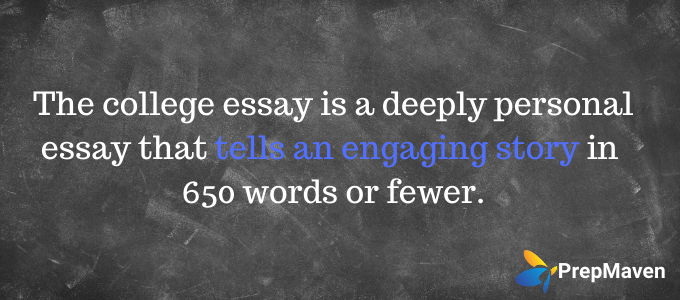
Example of a College Essay That Worked
Take a look at this essay that earned its writer acceptance into Princeton. We won’t take a super deep dive into the components that make it great.
But we do want to point out a handful of things that align with our definition of the college essay. This essay:
- Tells an engaging story
- Clearly conveys the author’s voice
- Is rich with introspection and reflection
- Provides insight into the author’s character, values, and perspective
- Is not an academic essay or list of accomplishments
- Is deeply personal
It also exemplifies the 7 qualities of a successful college essay .
Here’s the full essay:
“So long as you have food in your mouth, you have solved all questions for the time being.” – Franz Kafka
Kafka, I’m afraid, has drastically overestimated the power of food. And though it pains me to undermine a statement by arguably the greatest writer of the 20 th century, I recognize it as a solemn duty. Perhaps Kafka has never sat, tongue wild in an effort to scrape residual peanut butter off his molars, and contemplated the almost ridiculous but nevertheless significant role of peanut butter in crafting his identity. Oh, did I just describe myself by accident? Without further ado, the questions (and lack of answers, I point out) that I contemplate with peanut butter in my mouth.
When I was three and a half years old, my tongue was not yet versed in the complex palate of my peers, consisting mainly of peanut butter and jelly sandwiches. (It did not help my transition into pre-school that I did not speak English, but Russian and that my name, which had been hurriedly switched from Alya to Alex, was unpronounceable to me.) But it is most worth noting that I refused lunch for months, waited at the windowsill with tear-stained cheeks every day unless my mom left law school midday to bring my own comfort food: borscht, katlety, kampot.
I slowly assimilated into American culture, like most immigrant kids. I began to eat the peanut butter sandwiches at pre-school in the presence of my mom, and then did not need her altogether. She must have been elated that I was comfortable, that she could stay at school all day without worrying. She must have been destroyed when I waved her away the first time and told her I did not need her to come anymore.
I realized much later that the Russian food my mother brought me in pre-school made me comfortable enough to learn the language of the children there, to share their lunches, to make friends. Ironically, my Russian culture enabled the rise and dominance of American culture. When my parents wanted to visit their birthplace, my birthplace, Odessa, Ukraine, I rolled my eyes and proclaimed Disney Land, Florida. I rolled my eyes when I spoke too fast for my parents to understand. I rolled my eyes when I checked my mom’s grammar and when she argued with customer service in her thick Russian accent.
Peanut butter, and foods like it, represented not only my entrance into American culture, but the swift rejection of anything Russian that followed. Chicken noodle soup replaced borscht, meatballs replaced katlety, Sunny D triumphed over kampot. I became embarrassed by the snacks packed in my brown paper bag, begged for Cheetos, lime Jell-O cups, and that creamy spread between two damp pieces of Wonder Bread. My American identity tried to eclipse the Russian one altogether.
I realized later still that the identity battle I fought must have been more difficult to watch for my parents than it could have ever been for me to experience. They let me figure myself out, even though it meant I spent years rolling my eyes at them. Though I do not claim to have discovered a perfect balance of Russian and American, I would venture that a healthy start is eating peanut butter for lunch and katlety at dinner.
So, Kafka, I hope that next time a memorable quote comes to mind, you think before you speak. Because when peanut butter cleaves to the roof of my mouth, I think about what it means “to cleave:” both to adhere closely to and to divide, as if by a cutting blow, especially along a natural weakness. And I think about my dual identity, how the Russian side and American side simultaneously force each other apart and bring each other together. I think about my past, feeling a little ashamed, and about my present and future, asking how I can create harmony between these two sides of me. That, Kafka, does not sound like solved questions to me.
Want to read more essays that worked? Download our 30 college essays that earned their writers Ivy League acceptance for free below.
The College Essay’s Role in Admissions
In our post about what college admissions officers are looking for , we outline the Golden Rule of Admissions.

We also define “a student of exceptional potential.” In general, competitive applicants to top U.S. colleges and universities exemplify three pillars:
- Character and personal values
- Extracurricular distinction
- Academic achievement
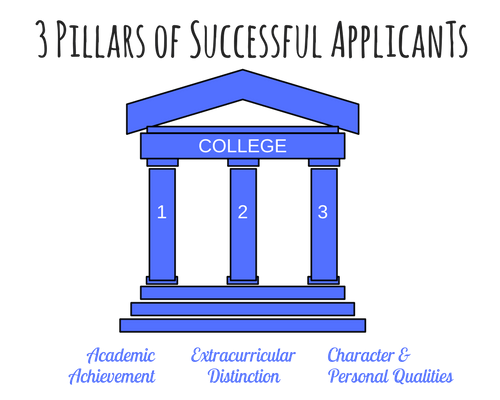
Admissions officers have a lot at their disposal when it comes to assessing extracurricular distinction and academic achievement. They’ve got transcripts, test scores, resumes, and letters of recommendation.
But how do they assess character and personal values?
A recent survey of admissions officers revealed some interesting answers to this question.

Source : National Association for College Admissions Counseling
Notice how an overwhelming 87% of officers surveyed reported that they infer character and personal qualities of an applicant from the content of the college essay!
The Common Data Set for individual colleges further supports this notion that officers infer character and values through the college essay, teacher recommendations, and other application components. The CDS for Cornell , for example, reveals that the application essay and character/personal qualities are “very important” in admission decisions.

What’s more, the COVID-19 pandemic profoundly altered the college application landscape by introducing some serious inequity in the realm of extracurricular activities, academics, and general access.
Many admissions officers have stressed their focus on character and personal values (more qualitative components) in recent admissions cycles as a result.
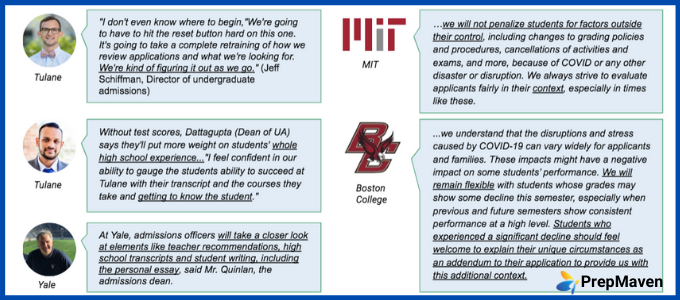
Schools are hungry for as much material as possible that they can use to assess students’ character and values! This is one of the reasons why many top colleges require applicants to answer supplemental essay questions — ones in addition to the college essay. These essays can range from 50-650 words, and many colleges have more than one.
For example, Princeton requires applicants to respond to six supplemental essay questions . Here’s one of them from the 2022-2023 admissions cycle:
At Princeton, we value diverse perspectives and the ability to have respectful dialogue about difficult issues. Share a time when you had a conversation with a person or a group of people about a difficult topic. What insight did you gain, and how would you incorporate that knowledge into your thinking in the future?
So how important is the college essay in the application process?
Princeton’s former Dean of Admissions summed it up nicely with this quote about the college essay in a conversation with the New York Times :
Your ability to write well is critical to our decision because your writing reflects your thinking. No matter what question is asked on a college application, admission officers are looking to see how well you convey your ideas and express yourself in writing. It is our window to your world.
Now that you know what the college essay is and how it influences college admissions, let’s discuss the challenges in writing it. This list isn’t comprehensive, but it does compile some of the most common challenges most students face when preparing to write their personal statement.
Challenge #1: The Pressure
The college essay is integral to the college admissions process. It’s only likely to carry more weight in coming admission cycles in the wake of COVID-19 .
There is immense pressure on students to write essays that will make them competitive in admissions! This essay can also very much feel like uncharted territory for students given their lack of experience in the world of personal writing. This pressure can become a veritable roadblock in writing the college essay.
Challenge #2: What’s Introspection?
Successful college essays are deeply personal and full of introspection. We define introspection as reflection on what’s important in your life — values, beliefs, opinions, experiences, etc. It also can have a lot to do with what makes you you .
To some students, introspection might come naturally. To others, it might not! This is understandable. The high school classroom doesn’t necessarily give space for students to reflect on what they’ve learned from certain experiences or what they believe are their core values. However, this is exactly what admissions officers are looking for in essays!

Challenge #3: You Just Don’t Write Personal Essays in School
Most English classes spend a lot of time on the academic essay . But most don’t include many units on writing personal essays or creative nonfiction–if any!
Many students writing the college essay thus face an entirely unfamiliar genre that comes with its own word limit, structure, and style of writing.
Challenge #4: The Word Limit
Both the Common App and Coalition require students to limit their essays to 650 words. That’s a little over a page of writing, single-spaced.
This means that students have to be incredibly concise in crafting their responses. This can be a tall order given what the college essay often includes: big ideas, big themes, and big reflection!
Challenge #5: Choosing a Topic
Given the college essay’s requirements, it can be tough to choose the “right” topic . Should you discuss an extracurricular activity ? Personal experience? An important mentorship figure?
Some students have a wide variety of experiences and personal stories to choose from. Others might feel that they have a limited number.
Challenge #6: Choosing a Structure
Let’s say that you’ve chosen your college essay topic. Now how do you fit it into a concise structure that gives ample air space to what college admissions officers are looking for?
Choosing a structure can be critical for telling your specific story in a compelling fashion. But once again, this is unfamiliar terrain for most students who haven’t really written a personal essay before.
And when we say that structure really is critical for college essay writing, we mean it–we’ve written an entire post on college essay structure .
Challenge #7: Getting Started
Last but not least, it can be incredibly difficult simply to start the college essay writing process. From choosing a topic to writing that first draft, there’s a lot to navigate. Many students also have a lot going on in general when they get around to writing their essays, including AP exams, summer programs , and the chaos of senior fall schedules.
If this sounds like where you’re at in the college essay writing journey, keep reading. We’ve got 6 tips coming up to help you take those first steps.
How To Write an Amazing College Essay – 6 Tips
You’ve learned what a college essay is and the weight it carries in college admissions. You’ve also heard a bit about what makes this essay challenging. Now what?
It’s time to get started writing your very own.
The following tips are designed to help you begin the journey towards an amazing college essay, regardless of your story, college aspirations, or timeline. Let’s dive in.

Tip #1: Give Yourself Time & Get Organized
Good college essays take time, and we mean time . We recommend that students establish a generous timeline for writing their personal statements. Ideally, students should start thinking about their essays seriously in the spring of their junior year or summer immediately following.
It’s also important to get organized. Create separate documents for brainstorming and free-writes, for example, and clearly mark your drafts based on where you’re at in the writing process.
We also recommend researching supplemental essay prompts for the colleges on your list and keeping track of these–including deadlines and word limits–in a spreadsheet. This is especially important for students applying early.
Tip #2: Practice Introspection
You can start flexing your introspective muscles before writing your essay! Practice journaling, for example, or responding to daily reflective prompts like the following:
- What is your greatest strength? Weakness?
- What is one of your core beliefs? Why is it core?
- What is your best quality?
- What matters to you? Why?
- What challenges you? Why?
The New York Times has even released 1,000 free writing prompts for students that range from identity and family to social life and technology.
With introspection, focus on using “I” as much as possible. This can feel awkward, especially as most English teachers encourage students to avoid using “I” in academic essays. But it’s the key to deep reflection.
You can also check out our post on College Essay Brainstorming or download 30 FREE college essay brainstorming questions right here.
Tip #3: Familiarize Yourself with Personal Writing & Storytelling
Immerse yourself in examples of powerful personal writing and storytelling. A great place to start is by downloading our 30 examples of college essays that earned students Ivy League acceptance or checking out our 11 College Essays That Worked post .
Otherwise, check out memoirs or creative essay collections.
The Moth , a storytelling radio project, is another great resource for students looking to learn more about how people tell personal stories in an engaging fashion. Plus, it’s just plain fun to listen to!
Tip #4: Know What Makes for An Amazing Essay
What qualities do most successful college essays have?
We’ve done the research. A successful college essay is often:
- Introspective and reflective
- Full of a student’s voice
- Descriptive and engaging
- Unconventional and distinct
- Well-written
We take a deeper dive into these 7 qualities of a successful college essay in a separate post.
Tip #5: Review Supplemental Essay Questions
Don’t forget about supplemental essay questions! It’s easy to overlook these or assume that they are less important than the college essay.
But remember–many colleges require supplemental essays as a means of gaining more information about competitive applicants. The Common App and Coalition also now have optional COVID-19 essay questions (learn our tips for answering these COVID-related questions here ).
Don’t save your supplemental essays for the last minute! Review questions well in advance through the Common App or Coalition platform so that you are aware of the other responses you’ll have to write.
We’ve actually compiled the supplemental essay questions for the top 50 U.S. colleges and universities right here.
You can also check out our 8 tips for writing amazing supplemental essay responses .
Tip #6: Work with a Mentor
Yes, it is possible to write your college essay, personal as it is, under the right one-on-one guidance. Mentors can help you with all stages of the college essay writing process, from topic brainstorms to final draft polishing.
They can also help create an actionable timeline for tackling both the college essay and all of those supplements, and hold students accountable!
You can sign up to work with one of PrepMaven’s master essay consultants if you’d like. Or check out our summer College Essay Workshops .

One of the best ways to start the college essay writing process is to look at examples of successful essays. But these examples can be hard to find, and few and far between.
That’s why we compiled 30 college essays that earned their writers acceptance into Ivy League schools. You can download these examples for FREE below.

Kate is a graduate of Princeton University. Over the last decade, Kate has successfully mentored hundreds of students in all aspects of the college admissions process, including the SAT, ACT, and college application essay.
Privacy Preference Center
Privacy preferences.
Think you can get into a top-10 school? Take our chance-me calculator... if you dare. 🔥
Last updated March 22, 2024
Every piece we write is researched and vetted by a former admissions officer. Read about our mission to pull back the admissions curtain.
Blog > Application Strategy , Essay Advice > College Essay Requirements: Everything You Need to Know
College Essay Requirements: Everything You Need to Know
Admissions officer reviewed by Ben Bousquet, M.Ed Former Vanderbilt University
Written by Kylie Kistner, MA Former Willamette University Admissions
Key Takeaway
College essays, also called personal statements, are essays that most colleges require students to write as part of their applications for admission.
We have a giant comprehensive guide on how to write college essays . But this post goes a little more in detail on the specific requirements you should meet when writing your personal statement for college.
Most students write a college essay for a centralized application system called the Common Application. The Common Application has its own standardized requirements for you to meet.
But you’re not just looking at logistical requirements like length and prompt choice. You also need to know answers to those intangible questions about what a college essay should actually DO.
In this post, we’ll start with the basics and end with a detailed discussion about those unspoken requirements for what your college essay needs to look like.
How long should a college essay be?
A college essay should be within the assigned word count requirements. The maximum word length for the Common Application personal statement (and other systems, like Coalition) is 650 words . That’s almost a page and a half single-spaced or nearly three pages double-spaced if you’re writing on a word processor.
What happens if you go under the word limit on a college essay?
To be clear, you do not have to write exactly 650 words to write a good Common Application essay.
A good rule of thumb that we use with our students is to get to about 80% of the word count. For the Common App essay, that would mean your goal should be to get to at least 520 words.
If you’re in the 520 to 650 range, it’s unlikely that an admissions officer would even think about your word count.
But if your essay doesn’t hit the 520 mark, then the length starts to raise some questions.
In particular, admissions officers might start scrutinizing whether you put enough time and effort into your essay. Don’t add words just to add words, but make sure your essay is fully developed enough to fall within the word length requirements.
What happens if you go over the word limit on a college essay?
Several things might happen if your essay is too long. You might be automatically cut off by the application system. Even if you are able to submit your essay, an admissions officer might stop reading when they notice that it’s too long. Or, worse, if your essay is over the word count because your language is long and rambling, you might bore an admissions officer.
For these reasons, it’s best to stay at or below the word limit.
If your essay is just a little too long, try these tips for cutting words:
- Cut any unnecessary tangents that don’t contribute to the overall theme of your essay.
- Eliminate cliche phrases or unnecessary idioms.
- Delete filler phrases like “in order to” or unnecessary adverbs like “really” or “very.”
If your essay is way over the word count, there’s a good chance you’re trying to do too many things at once. Take a step back and make sure your essay only has one main focus (and see our college essay writing guide for tips).
Can I submit an essay I’ve written for another class?
One of the Common Application prompts often looks something like this:
Share an essay on any topic of your choice. It can be one you've already written, one that responds to a different prompt, or one of your own design.
If that’s a prompt option, then you may be wondering whether you can save yourself a lot of time and hassle and submit an essay that you’ve already written, maybe even an essay from one of your classes.
While doing so is technically allowed by the prompt, we do not advise that you submit an essay you’ve written for something previously.
Why do we not recommend this?
Because personal statements have such a specific purpose (more on that in a minute), anything you’ve already written likely won’t fit the bill.
School assignments and past essays won’t say nearly enough about who you are. Admissions officers might enjoy a history essay you wrote about the French Revolution, but it probably won’t give them the information they need to confidently admit you.
Who reads college essays anyway, and what do they expect of you?
College essays are most commonly read by admissions officers. Admissions officers work for the undergraduate office of admission at the institution you’re applying to. While different offices have different practices, these admissions officers are generally full-time university employees. They often did not attend the university at which they work, though sometimes they did.
College admissions officers are generally assigned a regional territory, so they work with students and read applications from that territory. That means that if you go to most college admissions pages, you should be able to find your admissions counselor by inputting your geographic information. If you want, you can reach out to this person with any questions about the institution or application process.
Now on to the bigger question: what do they expect of you?
What an admissions officer expects from your college application essay depends on the kind of institution for which they work. Admissions officers at schools with lower acceptance rates, for example, will have higher expectations than those at schools with higher acceptance rates.
But across the board, there are a few things admissions officers expect from your college essays.
These expectations come from unspoken understandings of what a college essay should say and do.
The next section breaks down the five biggest college essay writing requirements you should try to follow.
College Essay Conventions
College essay requirements are about more than responding to a prompt and meeting a certain word count. They’re also about fulfilling the expectations that readers have of college essays. College essays are all about creating a cohesive narrative across your application. To help you accomplish that, there are a few conventions you should be aware of.
Tell a meaningful story about who you are
Why do college essays exist? They are an opportunity to tell admissions officers something about who you are as a person. As we know from our time as admissions officers ourselves, it can be difficult to truly understand who a person is from facts and figures alone. Transcripts and test scores tell us very little about your values, goals, and personality.
College essays should therefore communicate something meaningful about who you are. And when we say “meaningful,” we really mean it. College essays aren’t surface-level stuff. They get to the core of your background and motivations.
That doesn’t mean you have to write about your deepest, darkest secrets. But it does mean that you have to go below the surface to reveal a genuine personal insight.
Write vulnerably and authentically.
This tip is an extension of the previous one. To write a meaningful essay, you’ll need to write vulnerably and authentically.
Some college essays are just pleasantries that are so generic they could have been written by anybody.
The best college essays are ones that are written in your own voice. They open up a part of you that is normally reserved for close family and friends. They skip the formalities and get straight to the heart of why you are who you are.
It can be hard to write honestly for an audience full of faceless admissions officers who hold your fate in their hands. But it will be worth it.
Craft an essay that focuses on your strengths.
Here’s the thing. You can’t write just any old essay for your college essay. Your essay needs to be strategic. And to be strategic, it needs to revolve around your strengths.
Your college essay should showcase your strengths because you want to give the admissions officers who read your essays as many reasons as possible to admit you.
This isn’t to say that your essay should brag about all your accomplishments. Instead, being strengths-based means that whatever story you tell should leave admissions officers with a positive impression of who you are. They should be able to pick you out of a crowd and say, “Wow, this student is a really strong scholar/entrepreneur/artist/friend/caregiver/etc.”
By highlighting your strengths, you’ll show admissions officers why you belong on their campus.
Find the correct tone.
“Tone” refers to the overarching voice and vibe of an essay. Some college essays have serious tones, while others are lighthearted or funny.
The correct tone for your essay will depend on the topic you choose and the strengths you want to convey.
Most importantly, however, your tone should always end on some kind of positive, hopeful note.
It’s okay to write about difficult or serious topics, but they shouldn’t weigh your essay down and leave your admissions officer feeling uneasy afterward. Similarly, a lighthearted essay shouldn’t be so flippant that it forgets to do its job as a college essay.
Finding the correct tone is a balancing act.
Adhere to the length and stylistic requirements.
It’s worth reiterating that adhering to the rules and requirements outlined by the application is an important part of college essay writing. You want to leave your admissions officers with the best impression possible.
That means that taking each part of your application seriously is important. Try to present yourself as a professional and thoughtful person who knows how to follow the rules.
Doing so will emphasize that you are a mature student ready to take on the challenges of attending college.
Writing a college essay is really different than writing an essay for school, so sticking to these tips will help keep you on track.
College essay requirements can be tricky to navigate. But following the guidelines and meeting your readers’ expectations will help you write a standout essay.
And if you want to learn even more about how to write a college essay, check out our guide to college essays and our Essay Academy program. 👋
Liked that? Try this next.

How A Selective Admissions Office Reads 50k Applications In A Season

How to Write a Personal Statement for Colleges

15 Amazing Personal Statement Examples (2024 Update)

How to Write Supplemental Essays that Will Impress Admissions Officers
"the only actually useful chance calculator i’ve seen—plus a crash course on the application review process.".
Irena Smith, Former Stanford Admissions Officer
We built the best admissions chancer in the world . How is it the best? It draws from our experience in top-10 admissions offices to show you how selective admissions actually works.
- How to Write a College Essay
College admissions experts offer tips on selecting a topic as well as writing and editing the essay.

Getty Images
Students can go online to review essay requirements for the colleges they want to apply to, such as word limits and essay topics. Many students may start with the Common App, an application platform accepted by more than 1,000 schools.
For college applicants, the essay is the place to showcase their writing skills and let their unique voice shine through.
"The essays are important in part because this is a student's chance to really speak directly to the admissions office," says Adam Sapp, assistant vice president and director of admissions at Pomona College in California.
Prospective college students want their essay, sometimes called a personal statement, to make a good impression and boost their chances of being accepted, but they have only several hundred words to make that happen.
This can feel like a lot of pressure.
"I think this is the part of the application process that students are sometimes most challenged by," says Niki Barron, associate dean of admission at Hamilton College in New York, "because they're looking at a blank piece of paper and they don't know where to get started."
That pressure may be amplified as many colleges have gone test optional in recent years, meaning that ACT and SAT scores will be considered if submitted but are not required. Other schools have gone test-blind and don't consider such scores at all. In the absence of test scores, some admissions experts have suggested that more attention will be paid to other parts of an application, such as the essay.
But just as each applicant is unique, so are college admissions policies and priorities.
"Being test optional hasn't changed how we use essays in our selection process, and I wouldn't say that the essay serves as a substitute for standardized test scores," Barron wrote in an email. "A student's academic preparation for our classroom experience is always front and center in our application review process."
On June 29, 2023, the Supreme Court ruled against college admissions policies that consider an applicant's race. The ruling, though, does not prohibit students from writing essays on how their race has affected them, which experts say could significantly affect how students approach this portion of their applications.
Essay-writing tips offered by experts emphasize the importance of being concise, coherent, congenial, unique, honest and accurate. An applicant should also flex some intellectual muscle and include vivid details or anecdotes.
From brainstorming essay topics to editing the final draft, here's what students need to know about crafting a strong college application essay.
Getting Started on the College Essay
How long should a college essay be, how to pick a college essay topic, writing the college essay, how the affirmative action ruling could change college essays, editing and submitting the college essay.
A good time for students to begin working on their essays is the summer before senior year, experts say, when homework and extracurricular activities aren't taking up time and mental energy.
Starting early will also give students plenty of time to work through multiple drafts of an essay before college application deadlines, which can be as early as November for students applying for early decision or early action .
Students can go online to review essay requirements for the colleges they want to apply to, such as word limits and essay topics. Many students may start with the Common App , an application platform accepted by more than 1,000 schools. Students can submit that application to multiple schools.
Another option is the Coalition Application, an application platform accepted by more than 130 schools. Students applying through this application choose from one of six essay prompts to complete and include with their application.
In addition to the main essay, some colleges ask applicants to submit one or more additional writing samples. Students are often asked to explain why they are interested in a particular school or academic field in these supplemental essays , which tend to be shorter than the main essay.
Students should budget more time for the writing process if the schools they're applying to ask for supplemental essays.
"Most selective colleges will ask for more than one piece of writing. Don't spend all your time working on one long essay and then forget to devote energy to other parts of the application," Sapp says.
Though the Common App notes that "there are no strict word limits" for its main essay, it suggests a cap of about 650 words. The Coalition Application website says its essays should be between 500 and 650 words.
"While we won't, as a rule, stop reading after 650 words, we cannot promise that an overly wordy essay will hold our attention for as long as you'd hoped it would," the Common App website states.
The word count is much shorter for institution-specific supplemental essays, which are typically around 250 words.
The first and sometimes most daunting step in the essay writing process is figuring out what to write about.
There are usually several essay prompts to choose from on a college application. They tend to be broad, open-ended questions, giving students the freedom to write about a wide array of topics, Barron says.
The essay isn't a complete autobiography, notes Mimi Doe, co-founder of Top Tier Admissions, a Massachusetts-based advising company. "It's overwhelming to think of putting your whole life in one essay," she says.
Rather, experts say students should narrow their focus and write about a specific experience, hobby or quirk that reveals something personal, like how they think, what they value or what their strengths are. Students can also write about something that illustrates an aspect of their background. These are the types of essays that typically stand out to admissions officers, experts say. Even an essay on a common topic can be compelling if done right.
Students don't have to discuss a major achievement in their essay – a common misconception. Admissions officers who spoke with U.S. News cited memorable essays that focused on more ordinary topics, including fly-fishing, a student's commute to and from school and a family's dining room table.
What's most important, experts say, is that a college essay is thoughtful and tells a story that offers insight into who a student is as a person.
"Think of the college essay as a meaningful glimpse of who you are beyond your other application materials," Pierre Huguet, CEO and founder of admissions consulting firm H&C Education, wrote in an email. "After reading your essay, the reader won't fully know you – at least not entirely. Your objective is to evoke the reader's curiosity and make them eager to get to know you."
If students are having trouble brainstorming potential topics, they can ask friends or family members for help, says Stephanie Klein Wassink, founder of Winning Applications and AdmissionsCheckup, Connecticut-based college admissions advising companies. Klein Wassink says students can ask peers or family members questions such as, "What are the things you think I do well?" Or, "What are my quirks?"
The essay should tell college admissions officers something they don't already know, experts say.
Some experts encourage students to outline their essay before jumping into the actual writing, though of course everyone's writing process differs.
The first draft of an essay doesn't need to be perfect. "Just do a brain dump," Doe says. "Don't edit yourself, just lay it all out on the page."
If students are having a hard time getting started, they should focus on their opening sentence, Doe suggests. She says an essay's opening sentence, or hook, should grab the reader's attention.
Doe offered an example of a strong hook from the essay of a student she worked with:
"I first got into politics the day the cafeteria outlawed creamed corn."
"I want to know about this kid," she says. "I’m interested."
The key to a good college essay is striking a balance between being creative and not overdoing it, Huguet says. He advises students to keep it simple.
"The college essay is not a fiction writing contest," Huguet says. "Admissions committees are not evaluating you on your potential as the next writer of the Great American Novel."
He adds that students should write in the voice they use to discuss meaningful topics with someone they trust. It's also wise to avoid hyperbole, as that can lose the readers' trust, as well as extraneous adverbs and adjectives, Huguet says.
"Thinking small, when done right, means paying close attention to the little things in your life that give it meaning in unique ways," he says. "It means, on the one hand, that you don’t have to come up with a plan for world peace, but it also means thinking small enough to identify details in your life that belong only to you."
The Supreme Court's ruling on affirmative action has left some students feeling in limbo with how to approach their essays. Some are unsure whether to include racial identifiers while others feel pressure to exclude it, says Christopher Rim, CEO and founder of Command Education, an admissions consulting company.
"For instance, some of our Asian students have been concerned that referencing their culture or race in their essay could negatively impact them (even moreso than before)," Rim wrote in an email. He noted that many students he works with had already begun crafting their essays before the ruling came. "Some of our other students have felt pressure to disclose their race or share a story of discrimination or struggle because they expect those stories to be received better by admissions officers."
Some of the uneasiness stems from what feels like a contradictory message from the court, Rim says. In his majority opinion, Chief Justice John Roberts Jr., said the ruling shouldn't be construed "as prohibiting universities from considering an applicant’s discussion of how race affected his or her life, be it through discrimination, inspiration, or otherwise." But he added that colleges may consider race only if it's tied to an applicant’s individual experiences or qualities, such as demonstrating courage against discrimination.
Personal essays shouldn't serve as a way for universities to ask students about their race as a means to admit them on such basis, Roberts added.
Rim says he expects there to be a lot of confusion from parents and students as they navigate that line when writing their essay. He says his guidance will vary with each student depending on their specific situation.
"For a student from an immigrant family, sharing their racial and cultural background may be integral to understanding their identity and values and therefore should be included in the essay," he says. "On the other hand, a student who has never meaningfully considered ways in which their race has shaped their life experience and worldview should not push themselves to do so in their essay simply because they believe it will better their chances."
While admissions officers try to learn about students via the essay, they are also gauging writing skills, so students want to make sure they submit top-notch work.
"The best writing is rewriting," Sapp says. "You should never be giving me your first draft."
When reviewing a first essay draft, students should make sure their writing is showing, not telling, Huguet says. This means students should show their readers examples that prove they embody certain traits or beliefs, as opposed to just stating that they do. Doing so is like explaining a joke to someone who's already laughed at it, he says.
"Let’s say, for example, that the whole point of a certain applicant’s essay is to let admissions officers know that she thinks outside the box. If she feels the need to end her essay with a sentence like, 'And so, this anecdote shows that I think outside the box,' she’s either underestimating the power of her story (or the ability of her reader to understand it), or she hasn’t done a good enough job in telling it yet," Huguet says. "Let your readers come to their own conclusions. If your story is effective, they’ll come to the conclusions you want them to."
After editing their essay, students should seek outside editing help, experts recommend. While there are individuals and companies that offer paid essay help – from editing services to essay-writing boot camps – students and families may not be able to afford the associated fees. Some providers may offer scholarships or other financial aid for their services.
The availability and level of feedback from free essay advising services vary. Some college prep companies offer brief consultations at no charge. Free essay workshops may also be available through local high schools, public libraries or community organizations. Khan Academy, a free online education platform, also offers a series of videos and other content to guide students through the essay writing process.
Colleges themselves may also have resources, Barron notes, pointing to pages on Hamilton's website that offer writing tips as well as examples of successful admissions essays. Likewise, Hamilton also holds virtual panel discussions on writing admissions essays.
Students have other options when it comes to essay help. They can ask peers, teachers, school counselors and family members for help polishing an essay. Huguet says it's typically wise to prioritize quality over quantity when it comes to seeking feedback on essays. Too many perspectives can become counterproductive, he says.
"While it can be valuable to have different perspectives, it's best to seek out individuals who are experts in the writing process," he says. "Instructors or professors can be helpful, particularly if they possess subject expertise and can provide guidance on refining arguments, structure and overall coherence."
Proofreaders should not change the tone of the essay. "Don't let anyone edit out your voice," Doe cautions.
And while proofreading is fair game, having someone else write your essay is not.
When an essay is ready to go, students will generally submit it online along with the rest of their application. On the Common App, for example, students copy and paste their essay into a text box.
Sapp says even though students often stress about the essay in particular, it's not the only thing college admissions officers look at. "The essay is the window, but the application is the house," he says. "So let's not forget that an application is built of many pieces."
Searching for a college? Get our complete rankings of Best Colleges.
What to Do After Selecting a College

College Admissions
- How to Complete a College Application
- Use the Common App to Apply to College
- College Application Essay Grammar Tips
- See College Essay Examples
Tags: education , colleges , college admissions , college applications , students
2024 Best Colleges

Search for your perfect fit with the U.S. News rankings of colleges and universities.
College Admissions: Get a Step Ahead!
Sign up to receive the latest updates from U.S. News & World Report and our trusted partners and sponsors. By clicking submit, you are agreeing to our Terms and Conditions & Privacy Policy .
Ask an Alum: Making the Most Out of College
You May Also Like
How to decide if an mba is worth it.
Sarah Wood March 27, 2024

What to Wear to a Graduation
LaMont Jones, Jr. March 27, 2024

FAFSA Delays Alarm Families, Colleges
Sarah Wood March 25, 2024

Help Your Teen With the College Decision
Anayat Durrani March 25, 2024

Toward Semiconductor Gender Equity
Alexis McKittrick March 22, 2024

March Madness in the Classroom
Cole Claybourn March 21, 2024

20 Lower-Cost Online Private Colleges
Sarah Wood March 21, 2024

How to Choose a Microcredential
Sarah Wood March 20, 2024

Basic Components of an Online Course
Cole Claybourn March 19, 2024

Can You Double Minor in College?
Sarah Wood March 15, 2024

- Experiences
- Specialties
- Medical School
- Interview Prep
- Casper Prep
- Rising Researchers
- Application iQ
- Meet The Team
- Partnerships
- BS/MD Admissions Resources
- Medical School Admissions Resources
- Essays Resources
- Casper Book
- Free Online Courses
- Schedule a Call
List of Supplemental Essays Required By Top Colleges
By Michaela • October 31, 2021 • College Application Early Admission
Looking for a quick reference to the essays required by the colleges on your list? Check out our list of supplemental essays required by many of the top colleges students apply to each year. If you need help with these essays schedule a meeting with one of our essay coaches today!
Previous Post
- Free Consultation
- The Spark Advantage
- Who We Serve
- About Admissions Consultants
- Testimonials
- College Admissions
- BS/MD Programs
- Private School Admissions
- Transfer Admissions
- Results by Year
- > College Admissions
Colleges That Require the SAT Essay (2020): A Complete List

The SAT essay has been through a lot of changes in recent years. In the new SAT, it exists as a separate section from the rest of the sections. You may have heard that not all schools require it, even the ones that require standardized test scores. Why is that? Also, just because it isn’t required, does that mean you don’t have to do it? And what’s a good essay score, anyway?
First, a few things about the SAT and ACT optional essays:
- The essay portion is scored completely separately from the Math and Reading sections (or, in the case of the ACT, the Math, Reading, and Science sections). That means your total score is not affected by your SAT Essay or ACT Essay (Writing) score.
- The SAT Essay is graded by two College Board readers who each give it a score between 1 and 4 on three different aspects: reading, analysis, and writing. That means the highest possible SAT Essay grade is an 8|8|8. The ACT Writing section is also scored by two readers, each out of 6 (for a high score of 12).
- You have the choice to take the SAT and ACT with or without the essay. If you opt to take the essay version, the test is slightly longer and slightly more expensive.
Second, the most important thing you can take away from this post is: don’t assume you need to take the SAT or ACT with the essay ! The number of schools that require it is low, and fewer and fewer schools are even recommending it. In recent years, schools like the California Institute of Technology, Claremont McKenna College, and the University of Michigan have all stopped asking for it. Princeton University started asking for a graded paper instead.
In short? Unless you know you’re going to score well, based on past experience or a diagnostic test, or you’re applying to certain schools, reconsider if preparing for the ACT/SAT Essay is a good use of your test prep time or if you should just skip it altogether.
Which Schools Want to See the SAT Essay/ACT Writing?
A very small number of schools outright require the SAT Essay or ACT Writing. They are:
- All of the University of California schools
- The United States Military Academy
- University of Montana-Western
- Martin Luther College
- Soka University of America
That’s it! Of course, the University of California system is huge and includes heavy hitters like Berkeley, Los Angeles, Santa Barbara, and more. If you’re considering applying to any of these schools, you’ll need to take the SAT Essay. Otherwise, unless these remaining schools are on your list, you don’t explicitly need to take the essay as part of the SAT.
However, in college admissions, required isn’t the end of the line. A good number of additional schools recommend the SAT Essay. For these schools, you won’t be automatically turned away without the essay, but it’ll help your chances to have it present.
You might be surprised to learn that most of the very top schools – Harvard University, Yale University, Brown University, etc. – are not terribly interested in the SAT Essay, even though they care quite a bit about your overall SAT score (or ACT score). That’s in part because highly selective schools ask high school applicants for extensive essays, which they use to evaluate applicant’s proficiency with written English.
The colleges and universities that recommend the SAT Essay are:
- Abilene Christian University
- Austin College
- Berry College
- Chapman University
- Colby College
- Concordia College-Moorhead
- Duke University
- Michigan State University
- Oregon State University
- Simmons University
- Stanford University
- Stony Brook University-SUNY
- Taylor University
- University at Buffalo-SUNY
- University of Minnesota-Twin Cities
If any of these schools are on your list, you should seriously consider including the essay in your SAT or ACT test prep plans. Still, there are a few things to keep in mind.
Should You Take the SAT or ACT Essay?
While you could, of course, make your decision about taking the SAT Essay based on the schools to which you know you’re applying, the majority of students take the SAT or ACT before they’ve finalized their college lists. For that reason, you may need to decide whether to take the essay without knowing whether you’re planning to apply to any of the above schools.
So, if you’re signing up for the SAT or ACT soon, consider the following:
Advantages of Taking the SAT Essay or ACT Writing
The biggest advantage to taking the SAT Essay is that you cover all your bases. If you decide to apply to any of the schools on the required or recommended lists, you won’t have to go back and take it again or risk rejection for not having taken it.
Similarly, the SAT Essay can provide another data point for admissions officers about the strength of your academic profile and application—if you do well. An above-average essay or writing score can help prove your writing abilities to colleges.
On the flip side, not taking the SAT Essay at all will limit the number of schools to which you can apply and be a competitive applicant. While many selective schools do not care about the essay, some do, and they’re always looking for a reason to reject applicants. Not having an essay score could sink your application at Duke or Stanford.
Disadvantages of Taking the SAT Essay or ACT Writing
The biggest potential downside to taking the SAT Essay is that you might not score well, and colleges that don’t require or recommend the essay will have a piece of information that doesn’t show you in your best light. Given that most schools don’t want the essay, having a poor SAT Essay score can be a risk that isn’t worth taking.
Another disadvantage to taking the essay or writing portion is that you’ll be in the room longer. Fortunately, both sections come at the end of their respective tests, so it won’t tire you out for the rest of the test, but knowing that you’re going to be there an extra hour can affect students’ performance on the sections that matter most.
Similarly, another advantage to not taking the Essay portion is not having to prepare for it! College Board and ACT readers are looking for very specific elements, so you’ll need to spend time preparing, just as you would for the other sections. That’s time that might be better spent on the rest of the test, schoolwork, or extracurricular activities.
Who Should Take the SAT with Essay?
Those are the big-picture considerations for whether to take the SAT Essay or ACT Writing section, but it’s also worth thinking about the specifics of your college application. Much like decisions about the SAT Subject Tests, it’s important to consider your unique application. Are you someone who should definitely take the SAT with essay? Probably? Or definitely not?
Do the colleges you’re interested in require the SAT Essay?
If you’re interested in any of the above colleges that have an SAT or ACT essay requirement, you should take it. It won’t be the most important factor in your application, but not having it will be a huge red flag to these schools that you’re not serious about them because you didn’t take the time to read and understand their requirements.
Do the colleges you’re interested in recommend the SAT Essay?
Require is easy; recommend is a bit more complicated. When it comes to college admissions, it’s best to take colleges at their word. So, while schools like Michigan State may not turn you away with no SAT Essay score, they’ll be disappointed you don’t have it, unless you have a compelling reason like financial hardship. Duke University in particular has dropped numerous hints that they frown upon applications without the essay section.
Note that even some test-optional schools, like Coby, recommend the SAT or ACT essay. Of course, these schools are test-optional, so you don’t need to submit any standardized test essay at all. But because they care so much about writing skills, they want to see the essay; otherwise, even if you have a very high score, they may be insufficiently impressed.
Are you applying to any scholarships that require an SAT with Essay?
On top of that, colleges may not be the only thing you’re applying to this year! Because standardized tests play a big role in many scholarships – both offered by colleges and by external institutions – you should always check to see if any scholarships for which you’re planning to apply require you to submit SAT Essay or ACT Writing score reports.
Will the SAT Essay enhance your application?
Lastly, if you’re someone who excels in writing and feels comfortable with the SAT Essay, you might decide that taking it will boost your application! Although the essay won’t be factored into your total SAT score, it may still make a positive impact if you struggle in other areas. For some students, a writing test is something they definitely want colleges to see!
Final Thoughts
The most important thing to keep in mind about the writing sections of the SAT and ACT is that you need to do what’s best for your college goals and strategy. Remember that you don’t need to do the Essay section at every test date, so it may be that you want to take a first pass at the test and decide about the essay later. Or, you may know that it’s going to be required by one or more of your colleges, so you want to get a jump right away.
At the end of the day, wherever you’re applying, the SAT Essay or ACT Writing is just one part of your application, one that seems to hold less importance every year. While it’s important to take all parts of the process seriously, this isn’t one of the ones worth stressing about.
Subscribe to our newsletter for college admissions news
Related articles from the spark admissions blog.

What Does Test Blind Mean?
Categories: College Admissions

How to Get into the Best Colleges for Business

How to Get into the Best Colleges for Engineering
Spark admissions has the highest college admissions success rate in the country..
Contact us to learn more about our admissions consulting services.
Schedule Your Free Consultation
Frequently asked questions
Why do colleges ask for an essay.
Colleges want to be able to differentiate students who seem similar on paper. In the college application essay , they’re looking for a way to understand each applicant’s unique personality and experiences.
Frequently asked questions: College admissions essays
When writing your Common App essay , choose a prompt that sparks your interest and that you can connect to a unique personal story.
No matter which prompt you choose, admissions officers are more interested in your ability to demonstrate personal development , insight, or motivation for a certain area of study.
The Common App essay is your primary writing sample within the Common Application, a college application portal accepted by more than 900 schools. All your prospective schools that accept the Common App will read this essay to understand your character, background, and value as a potential student.
Since this essay is read by many colleges, avoid mentioning any college names or programs; instead, save tailored answers for the supplementary school-specific essays within the Common App.
Most importantly, your essay should be about you , not another person or thing. An insightful college admissions essay requires deep self-reflection, authenticity, and a balance between confidence and vulnerability.
Your essay shouldn’t be a résumé of your experiences but instead should tell a story that demonstrates your most important values and qualities.
When revising your college essay , first check for big-picture issues regarding your message and content. Then, check for flow, tone, style , and clarity. Finally, focus on eliminating grammar and punctuation errors .
If your college essay goes over the word count limit , cut any sentences with tangents or irrelevant details. Delete unnecessary words that clutter your essay.
If you’re struggling to reach the word count for your college essay, add vivid personal stories or share your feelings and insight to give your essay more depth and authenticity.
If you’ve got to write your college essay fast , don’t panic. First, set yourself deadlines: you should spend about 10% of your remaining time on brainstorming, 10% on outlining, 40% writing, 30% revising, and 10% taking breaks in between stages.
Second, brainstorm stories and values based on your essay prompt.
Third, outline your essay based on the montage or narrative essay structure .
Fourth, write specific, personal, and unique stories that would be hard for other students to replicate.
Fifth, revise your essay and make sure it’s clearly written.
Last, if possible, get feedback from an essay coach . Scribbr essay editors can help you revise your essay in 12 hours or less.
Avoid swearing in a college essay , since admissions officers’ opinions of profanity will vary. In some cases, it might be okay to use a vulgar word, such as in dialogue or quotes that make an important point in your essay. However, it’s safest to try to make the same point without swearing.
If you have bad grades on your transcript, you may want to use your college admissions essay to explain the challenging circumstances that led to them. Make sure to avoid dwelling on the negative aspects and highlight how you overcame the situation or learned an important lesson.
However, some college applications offer an additional information section where you can explain your bad grades, allowing you to choose another meaningful topic for your college essay.
Here’s a brief list of college essay topics that may be considered cliché:
- Extracurriculars, especially sports
- Role models
- Dealing with a personal tragedy or death in the family
- Struggling with new life situations (immigrant stories, moving homes, parents’ divorce)
- Becoming a better person after community service, traveling, or summer camp
- Overcoming a difficult class
- Using a common object as an extended metaphor
It’s easier to write a standout essay with a unique topic. However, it’s possible to make a common topic compelling with interesting story arcs, uncommon connections, and an advanced writing style.
Yes. The college application essay is less formal than other academic writing —though of course it’s not mandatory to use contractions in your essay.
In a college essay , you can be creative with your language . When writing about the past, you can use the present tense to make the reader feel as if they were there in the moment with you. But make sure to maintain consistency and when in doubt, default to the correct verb tense according to the time you’re writing about.
The college admissions essay gives admissions officers a different perspective on you beyond your academic achievements, test scores, and extracurriculars. It’s your chance to stand out from other applicants with similar academic profiles by telling a unique, personal, and specific story.
Use a standard font such as Times New Roman or Arial to avoid distracting the reader from your college essay’s content.
A college application essay is less formal than most academic writing . Instead of citing sources formally with in-text citations and a reference list, you can cite them informally in your text.
For example, “In her research paper on genetics, Quinn Roberts explores …”
There is no set number of paragraphs in a college admissions essay . College admissions essays can diverge from the traditional five-paragraph essay structure that you learned in English class. Just make sure to stay under the specified word count .
Most topics are acceptable for college essays if you can use them to demonstrate personal growth or a lesson learned. However, there are a few difficult topics for college essays that should be avoided. Avoid topics that are:
- Overly personal (e.g. graphic details of illness or injury, romantic or sexual relationships)
- Not personal enough (e.g. broad solutions to world problems, inspiring people or things)
- Too negative (e.g. an in-depth look at your flaws, put-downs of others, criticizing the need for a college essay)
- Too boring (e.g. a resume of your academic achievements and extracurriculars)
- Inappropriate for a college essay (e.g. illegal activities, offensive humor, false accounts of yourself, bragging about privilege)
To write an effective diversity essay , include vulnerable, authentic stories about your unique identity, background, or perspective. Provide insight into how your lived experience has influenced your outlook, activities, and goals. If relevant, you should also mention how your background has led you to apply for this university and why you’re a good fit.
Many universities believe a student body composed of different perspectives, beliefs, identities, and backgrounds will enhance the campus learning and community experience.
Admissions officers are interested in hearing about how your unique background, identity, beliefs, culture, or characteristics will enrich the campus community, which is why they assign a diversity essay .
In addition to your main college essay , some schools and scholarships may ask for a supplementary essay focused on an aspect of your identity or background. This is sometimes called a diversity essay .
You can use humor in a college essay , but carefully consider its purpose and use it wisely. An effective use of humor involves unexpected, keen observations of the everyday, or speaks to a deeper theme. Humor shouldn’t be the main focus of the essay, but rather a tool to improve your storytelling.
Get a second opinion from a teacher, counselor, or essay coach on whether your essay’s humor is appropriate.
Though admissions officers are interested in hearing your story, they’re also interested in how you tell it. An exceptionally written essay will differentiate you from other applicants, meaning that admissions officers will spend more time reading it.
You can use literary devices to catch your reader’s attention and enrich your storytelling; however, focus on using just a few devices well, rather than trying to use as many as possible.
To decide on a good college essay topic , spend time thoughtfully answering brainstorming questions. If you still have trouble identifying topics, try the following two strategies:
- Identify your qualities → Brainstorm stories that demonstrate these qualities
- Identify memorable stories → Connect your qualities to these stories
You can also ask family, friends, or mentors to help you brainstorm topics, give feedback on your potential essay topics, or recall key stories that showcase your qualities.
Yes—admissions officers don’t expect everyone to have a totally unique college essay topic . But you must differentiate your essay from others by having a surprising story arc, an interesting insight, and/or an advanced writing style .
There are no foolproof college essay topics —whatever your topic, the key is to write about it effectively. However, a good topic
- Is meaningful, specific, and personal to you
- Focuses on you and your experiences
- Reveals something beyond your test scores, grades, and extracurriculars
- Is creative and original
Unlike a five-paragraph essay, your admissions essay should not end by summarizing the points you’ve already made. It’s better to be creative and aim for a strong final impression.
You should also avoid stating the obvious (for example, saying that you hope to be accepted).
There are a few strategies you can use for a memorable ending to your college essay :
- Return to the beginning with a “full circle” structure
- Reveal the main point or insight in your story
- Look to the future
- End on an action
The best technique will depend on your topic choice, essay outline, and writing style. You can write several endings using different techniques to see which works best.
College deadlines vary depending on the schools you’re applying to and your application plan:
- For early action applications and the first round of early decision applications, the deadline is on November 1 or 15. Decisions are released by mid-December.
- For the second round of early decision applications, the deadline is January 1 or 15. Decisions are released in January or February.
- Regular decision deadlines usually fall between late November and mid-March, and decisions are released in March or April.
- Rolling admission deadlines run from July to April, and decisions are released around four to eight weeks after submission.
Depending on your prospective schools’ requirements, you may need to submit scores for the SAT or ACT as part of your college application .
Some schools now no longer require students to submit test scores; however, you should still take the SAT or ACT and aim to get a high score to strengthen your application package.
Aim to take the SAT or ACT in the spring of your junior year to give yourself enough time to retake it in the fall of your senior year if necessary.
Apply early for federal student aid and application fee waivers. You can also look for scholarships from schools, corporations, and charitable foundations.
To maximize your options, you should aim to apply to about eight schools:
- Two reach schools that might be difficult to get into
- Four match schools that you have a good chance of getting into
- Two safety schools that you feel confident you’ll get into
The college admissions essay accounts for roughly 25% of the weight of your application .
At highly selective schools, there are four qualified candidates for every spot. While your academic achievements are important, your college admissions essay can help you stand out from other applicants with similar profiles.
In general, for your college application you will need to submit all of the following:
- Your personal information
- List of extracurriculars and awards
- College application essays
- Transcripts
- Standardized test scores
- Recommendation letters.
Different colleges may have specific requirements, so make sure you check exactly what’s expected in the application guidance.
You should start thinking about your college applications the summer before your junior year to give you sufficient time for college visits, taking standardized tests, applying for financial aid , writing essays, and collecting application material.
Yes, but make sure your essay directly addresses the prompt, respects the word count , and demonstrates the organization’s values.
If you plan ahead, you can save time by writing one scholarship essay for multiple prompts with similar questions. In a scholarship tracker spreadsheet, you can group or color-code overlapping essay prompts; then, write a single essay for multiple scholarships. Sometimes, you can even reuse or adapt your main college essay .
You can start applying for scholarships as early as your junior year. Continue applying throughout your senior year.
Invest time in applying for various scholarships , especially local ones with small dollar amounts, which are likely easier to win and more reflective of your background and interests. It will be easier for you to write an authentic and compelling essay if the scholarship topic is meaningful to you.
You can find scholarships through your school counselor, community network, or an internet search.
A scholarship essay requires you to demonstrate your values and qualities while answering the prompt’s specific question.
After researching the scholarship organization, identify a personal experience that embodies its values and exemplifies how you will be a successful student.
A standout college essay has several key ingredients:
- A unique, personally meaningful topic
- A memorable introduction with vivid imagery or an intriguing hook
- Specific stories and language that show instead of telling
- Vulnerability that’s authentic but not aimed at soliciting sympathy
- Clear writing in an appropriate style and tone
- A conclusion that offers deep insight or a creative ending
While timelines will differ depending on the student, plan on spending at least 1–3 weeks brainstorming and writing the first draft of your college admissions essay , and at least 2–4 weeks revising across multiple drafts. Don’t forget to save enough time for breaks between each writing and editing stage.
You should already begin thinking about your essay the summer before your senior year so that you have plenty of time to try out different topics and get feedback on what works.
Your college essay accounts for about 25% of your application’s weight. It may be the deciding factor in whether you’re accepted, especially for competitive schools where most applicants have exceptional grades, test scores, and extracurricular track records.
In most cases, quoting other people isn’t a good way to start your college essay . Admissions officers want to hear your thoughts about yourself, and quotes often don’t achieve that. Unless a quote truly adds something important to your essay that it otherwise wouldn’t have, you probably shouldn’t include it.
Cliché openers in a college essay introduction are usually general and applicable to many students and situations. Most successful introductions are specific: they only work for the unique essay that follows.
The key to a strong college essay introduction is not to give too much away. Try to start with a surprising statement or image that raises questions and compels the reader to find out more.
The introduction of your college essay is the first thing admissions officers will read and therefore your most important opportunity to stand out. An excellent introduction will keep admissions officers reading, allowing you to tell them what you want them to know.
You can speed up this process by shortening and smoothing your writing with a paraphrasing tool . After that, you can use the summarizer to shorten it even more.
If you’re struggling to reach the word count for your college essay, add vivid personal stories or share your feelings and insight to give your essay more depth and authenticity.
Most college application portals specify a word count range for your essay, and you should stay within 10% of the upper limit to write a developed and thoughtful essay.
You should aim to stay under the specified word count limit to show you can follow directions and write concisely. However, don’t write too little, as it may seem like you are unwilling or unable to write a detailed and insightful narrative about yourself.
If no word count is specified, we advise keeping your essay between 400 and 600 words.
In your application essay , admissions officers are looking for particular features : they want to see context on your background, positive traits that you could bring to campus, and examples of you demonstrating those qualities.
You don’t need a title for your college admissions essay , but you can include one if you think it adds something important.
Your college essay’s format should be as simple as possible:
- Use a standard, readable font
- Use 1.5 or double spacing
- If attaching a file, save it as a PDF
- Stick to the word count
- Avoid unusual formatting and unnecessary decorative touches
There are no set rules for how to structure a college application essay , but these are two common structures that work:
- A montage structure, a series of vignettes with a common theme.
- A narrative structure, a single story that shows your personal growth or how you overcame a challenge.
Avoid the five-paragraph essay structure that you learned in high school.
Campus visits are always helpful, but if you can’t make it in person, the college website will have plenty of information for you to explore. You should look through the course catalog and even reach out to current faculty with any questions about the school.
Colleges set a “Why this college?” essay because they want to see that you’ve done your research. You must prove that you know what makes the school unique and can connect that to your own personal goals and academic interests.
Depending on your writing, you may go through several rounds of revision . Make sure to put aside your essay for a little while after each editing stage to return with a fresh perspective.
Teachers and guidance counselors can help you check your language, tone, and content . Ask for their help at least one to two months before the submission deadline, as many other students will also want their help.
Friends and family are a good resource to check for authenticity. It’s best to seek help from family members with a strong writing or English educational background, or from older siblings and cousins who have been through the college admissions process.
If possible, get help from an essay coach or editor ; they’ll have specialized knowledge of college admissions essays and be able to give objective expert feedback.
When revising your college essay , first check for big-picture issues regarding message, flow, tone, style , and clarity. Then, focus on eliminating grammar and punctuation errors.
Include specific, personal details and use your authentic voice to shed a new perspective on a common human experience.
Through specific stories, you can weave your achievements and qualities into your essay so that it doesn’t seem like you’re bragging from a resume.
When writing about yourself , including difficult experiences or failures can be a great way to show vulnerability and authenticity, but be careful not to overshare, and focus on showing how you matured from the experience.
First, spend time reflecting on your core values and character . You can start with these questions:
- What are three words your friends or family would use to describe you, and why would they choose them?
- Whom do you admire most and why?
- What are you most proud of? Ashamed of?
However, you should do a comprehensive brainstorming session to fully understand your values. Also consider how your values and goals match your prospective university’s program and culture. Then, brainstorm stories that illustrate the fit between the two.
In a college application essay , you can occasionally bend grammatical rules if doing so adds value to the storytelling process and the essay maintains clarity.
However, use standard language rules if your stylistic choices would otherwise distract the reader from your overall narrative or could be easily interpreted as unintentional errors.
Write concisely and use the active voice to maintain a quick pace throughout your essay and make sure it’s the right length . Avoid adding definitions unless they provide necessary explanation.
Use first-person “I” statements to speak from your perspective . Use appropriate word choices that show off your vocabulary but don’t sound like you used a thesaurus. Avoid using idioms or cliché expressions by rewriting them in a creative, original way.
If you’re an international student applying to a US college and you’re comfortable using American idioms or cultural references , you can. But instead of potentially using them incorrectly, don’t be afraid to write in detail about yourself within your own culture.
Provide context for any words, customs, or places that an American admissions officer might be unfamiliar with.
College application essays are less formal than other kinds of academic writing . Use a conversational yet respectful tone , as if speaking with a teacher or mentor. Be vulnerable about your feelings, thoughts, and experiences to connect with the reader.
Aim to write in your authentic voice , with a style that sounds natural and genuine. You can be creative with your word choice, but don’t use elaborate vocabulary to impress admissions officers.
Admissions officers use college admissions essays to evaluate your character, writing skills , and ability to self-reflect . The essay is your chance to show what you will add to the academic community.
The college essay may be the deciding factor in your application , especially for competitive schools where most applicants have exceptional grades, test scores, and extracurriculars.
Some colleges also require supplemental essays about specific topics, such as why you chose that specific college . Scholarship essays are often required to obtain financial aid .
Ask our team
Want to contact us directly? No problem. We are always here for you.
- Email [email protected]
- Start live chat
- Call +1 (510) 822-8066
- WhatsApp +31 20 261 6040

Our team helps students graduate by offering:
- A world-class citation generator
- Plagiarism Checker software powered by Turnitin
- Innovative Citation Checker software
- Professional proofreading services
- Over 300 helpful articles about academic writing, citing sources, plagiarism, and more
Scribbr specializes in editing study-related documents . We proofread:
- PhD dissertations
- Research proposals
- Personal statements
- Admission essays
- Motivation letters
- Reflection papers
- Journal articles
- Capstone projects
Scribbr’s Plagiarism Checker is powered by elements of Turnitin’s Similarity Checker , namely the plagiarism detection software and the Internet Archive and Premium Scholarly Publications content databases .
The add-on AI detector is powered by Scribbr’s proprietary software.
The Scribbr Citation Generator is developed using the open-source Citation Style Language (CSL) project and Frank Bennett’s citeproc-js . It’s the same technology used by dozens of other popular citation tools, including Mendeley and Zotero.
You can find all the citation styles and locales used in the Scribbr Citation Generator in our publicly accessible repository on Github .

33 Colleges Without Supplemental Essays
At many top schools, essays form a critical part of the college admissions process. Overwhelmingly, students find writing essays to be the most stressful part of the application process. So, when applying to multiple schools, many applicants look for colleges without supplemental essays. Colleges that don’t require essays allow students to focus on other aspects of their application like extracurriculars, test scores, or recommendation letters.
However, finding colleges that don’t require supplemental essays can be tedious. That’s why we’ve created a list of 33 colleges without supplemental essays to make the search easier.
Contrary to what you may have heard, you can find college application requirements without supplemental essays. Moreover, a lack of supplemental essay requirements doesn’t mean a university isn’t good.
This guide will help you find colleges without supplemental essays that meet your needs. In addition to discussing colleges that don’t require essays, we’ll also talk about other college application requirements. By the end of this article, you’ll be better prepared for the college application process.
What is a supplemental essay?
Before you start searching for colleges that don’t require supplemental essays, it’s important to understand what they actually are. Supplemental essays are extra essays that each school requires; some schools require only one, while others require several. They cover a range of prompts from the “why school” essay to the cultural diversity essay and more. Usually, supplemental essays are rather short, hovering in the 50-250-word limit range. They serve as an opportunity to showcase an applicant’s strengths, moments of personal growth, and personality.
It’s important to note that supplemental essays are different from the personal statement on the Common Application . The Common App essay prompts allow you to submit one personal statement to every college where you apply. In other words, you’ll almost certainly write this personal statement plus supplemental essays for each college on your list . You can also look up each school’s supplemental writing requirements on the Common App site.
There aren’t many colleges that don’t require essays at all. However, that doesn’t mean there aren’t any colleges that don’t require supplemental essays. With that said, most American universities have some essay requirements, even if they don’t ask for writing supplements.
Supplemental essays vs. Personal Statement

Often, top colleges without supplemental essays will require students to write a personal statement . Recall that supplemental essays vary in length and number of essays to complete depending on the school. In contrast, the personal statement is one essay that most schools have as a part of their college application requirements. However, both supplemental essays and the personal statement are important when it comes to creating an authentic application narrative .
The personal statement is a part of the Common Application. There are seven prompts to choose from, one of which is open, meaning you can write anything you’d like. The personal statement is longer than most supplemental essays at 650 words. While you’ll just write on one of these prompts, the others touch on common college essay topics. Don’t hesitate to brainstorm for a few of the Common App prompts, not just one.
Supplemental essays are usually shorter than the personal statement. School requirements will vary. While there are colleges without supplemental essays at all, others may have as many as six!
How many supplemental essays do college require?
While there are competitive colleges without supplemental essays, the majority of universities require at least one supplemental essay. However, the number of required supplemental essays will vary greatly.
For example, Northeastern University doesn’t have a writing supplement requirement on the Northeastern application. However, that doesn’t necessarily make the Northeastern application easier than other universities. Since it’s a top school, applicants will still need to do everything possible to make their Northeastern application stand out.
Unlike the Northeastern application, the University of Chicago has one required “why school” essay and various supplemental essay prompts to choose from. In total, students applying to UChicago will write two supplemental essays.
When it comes to the number of supplemental essays a school requires, there is no single answer. All schools will be different, so be sure to check each school’s individual application requirements on their admissions sites.
What kind of colleges require essays?
Generally, it is rare to find colleges that don’t require essays at all. While there are some colleges without supplemental essays, most still require students to submit the personal statement. Therefore, most colleges in the U.S. require essays in some form. Even if you’re applying through a different platform like UC Apply or the Coalition Application , you’ll have to write.
A better question might be: why do colleges require essays? The majority of universities’ admissions teams use a holistic evaluation process. That means that each of the college application requirements receives equal consideration. Your supplemental essay is an opportunity to share more about yourself with admissions. Successful college essay ideas will center on stories that show personal growth and self-reflection.
What are college application requirements?

If you’re looking for colleges without supplemental essays, then you’ll need to sift through each school’s requirements. Simply put, college application requirements are all the materials that applicants need for a complete application.
Here are some of the most common application requirements:
- Basic biographical and demographic information
- Extracurricular activities
- Personal statement
- Application fee
- Transcripts
- Counselor and/or Teacher letter(s) of recommendation
In the application, students will be able to add their essays. Keep in mind that each school’s college application requirements vary, so you should confirm specifics on their websites.
Do all colleges require supplemental essays?
Luckily for those who dread essay writing, there are colleges without supplemental essays. Soon, we’re going to provide you with a comprehensive list of well-known colleges that don’t require supplemental essays.
However, keep in mind that most schools do require students to complete the personal statement. So, for those who are hoping to find colleges that don’t require essays of any kind, it will be challenging. Nevertheless, students who have an extreme aversion to essay writing will find some top colleges without supplemental essays.
Why apply to colleges that don’t require essays?
There are a few reasons that students want to apply to colleges without supplemental essays. Some students may feel like the essays are too stressful. And while there are ways to manage that stress and write compelling essays, some students may just prefer not to.
However, probably the number one reason that students are intrigued by colleges without supplemental essays is time. Thinking of college essay ideas and writing essays is time-consuming. When you consider that some students apply to as many as 15 schools, it can feel overwhelming. Even adding just a few colleges that don’t require essays to your college list will lighten the burden.
Additionally, there are many competitive colleges without supplemental essays. Just remember: if you apply to colleges without supplemental essays, make the rest of your application as competitive as possible. It certainly isn’t an excuse to slack on your application narrative. In fact, with colleges that don’t require essays, you must pay extra attention to your demonstration of academic achievements and extracurricular involvement.
As stated above, colleges without supplemental essays usually still require a personal statement. However, this essay can be used for multiple schools. That is to say, once it’s written, you’re set for all of your applications to colleges without supplemental essays.
33 Best Colleges without Supplemental Essays
Finally, it’s the moment you’ve been waiting for. Let’s check out some colleges without supplemental essays.
Top 33 Colleges without Essays
1. colby college.

This small liberal arts school in Waterville, Maine, is the first to make our list. As the 12 th oldest liberal arts school in the US, Colby College has ample experience providing students with an intimate learning environment. If you’re interested in a liberal arts education from a small Northeastern University, then check out Colby’s application requirements .
2. Grinnell College

Students who attend Grinnell are encouraged to “pursue passions with purpose.” While it may seem surprising that such a school numbers among colleges that don’t require essays, take advantage of it and apply ! Grinnell College is consistently a high-ranking liberal arts school. Here, students are encouraged to create a course of study that best supports their intellectual freedom.
3. Middlebury College

Another of the many liberal arts colleges without supplemental essays on our list is Middlebury College. Located in Vermont’s Champlain Valley, the natural beauty will inspire your learning as a natural laboratory is just outside. Its acceptance rate is 13%, so you’ll need an impeccable application in the absence of supplemental essays.
4. Colgate University

Located in New York state, Colgate University provides its students with a high quality liberal arts education. Like all others on our list, the Colgate application doesn’t include supplemental essays. There are 56 majors for students to choose from. Colgate values a curious mind, so be sure to show your curiosity in your Colgate application. Check out what you need to complete your Colgate application.
5. Temple University

This is the first public research university on our list of colleges without supplemental essays. Temple University has 17 schools and colleges in which to study, but an emphasis is placed on experiential learning. Given Temple’s location in the heart of North Philadelphia, students will have all the opportunities that the city provides.
6. Oberlin College

The one-of-a-kind education provided by Oberlin College allows students to explore both academics and the arts. Indeed, the Oberlin College ranking across metrics speaks for itself: the Oberlin College ranking in national liberal arts colleges is #39 . And, perhaps unsurprisingly, the Oberlin College ranking in Most Innovative Schools is #16 . Of course, the Oberlin College ranking isn’t everything. But, the Oberlin College ranking does speak to the school’s quality, unique liberal arts education. For Oberlin College (not the conservatory) no supplemental essay is needed.
7. Case Western Reserve University

There are hundreds of programs at Case Western Reserve for students to pursue. However, overall, the student population is committed to making a difference, with education a stepping stone to an impactful career. In addition to being one of our colleges without supplemental essays, Case Western Reserve is also test-optional through fall 2024.
8. Bates College

The Bates way is all about “aligning who you are with what you do.” Students will be a part of a community with values such as social responsibility and diversity and inclusion. Check out the requirements for what it takes to be a part of this unique campus. Keep in mind that the Bates College acceptance rate is quite competitive. In fact, the Bates College acceptance rate is considered most selective at 17% . So, although Bates is among the colleges that don’t require essays, the Bates College acceptance rate means intense competition for admittance.

9. Northeastern University

This well-known university in Boston , Massachusetts, is among the most competitive colleges without supplemental essays with an 18% acceptance rate. Experiential learning and research are among the core parts of a Northeastern University education. If you’re interested in innovation and impact, then see what you need to apply .
10. Hampshire College

It may be unsurprising that Hampshire College, the self-proclaimed “original disruptors of higher education,” is among the colleges that don’t require essays. Hampshire believes that their radical education experience leads to greater impact. This is a community that values experimentation, discovery, and investigation in a non-traditional manner. If that sounds up your alley, take a look at their application requirements.
11. DePaul University

This large private university in Chicago, Illinois, is next on our list of colleges without supplemental essays. Faculty provide high-quality teaching in order to give their students the best educational experience. DePaul aims to provide an experience that combines “mind, place, people, and heart.”
12. Drexel University

Located in Philadelphia, Pennsylvania, Drexel University is arguably one of the best colleges without supplemental essays. It’s nationally recognized for its co-op experience. This learning model allows all students to have ample hands-on experience in their field of interest before even graduating. Drexel admissions may not seem super competitive with an acceptance rate of 83% . However, that doesn’t mean you should slack on the application. Impressing Drexel admissions could lead to scholarships, which are also an extremely important part of the college application process.
13. Kenyon College

This college may not be a household name, but they’ve played a huge part in the model of faculty advising nationwide. In fact, according to Kenyon College , they invented it. So you can imagine the quality attention the learning experience that students will receive here.
14. Dillard University

Louisiana’s first private liberal arts HBCU makes our list of colleges without supplemental essays. The undergraduate population is around 1,200, making it a small school. At Dillard, students can expect personalized attention and a tight-knit campus community. After applying and being accepted, students will have 22 majors to choose from.
15. Skidmore College

Creative thinking is at the heart of Skidmore’s education model. Located in Saratoga Springs, New York, this private university offers students an excellent education in a bucolic college town . At Skidmore College , students are encouraged to explore a variety of educational interests as all majors are interdisciplinary.
16. Ohio State University
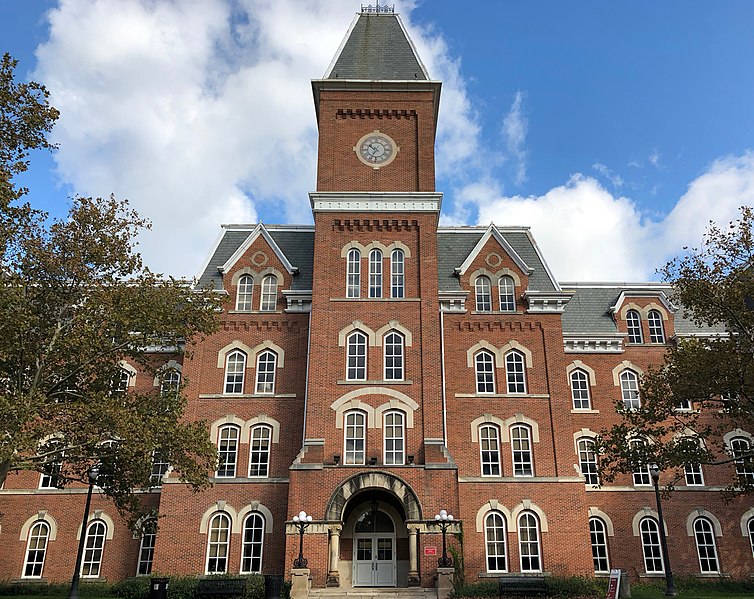
Located in Columbus, Ohio—the fastest-growing metropolitan in the Midwest — Ohio State University places an emphasis on improving local and global communities. In fact, they have contribution efforts in every county in Ohio. And, with six campuses throughout the state, students can choose which location will best serve them.
17. Louisiana State University
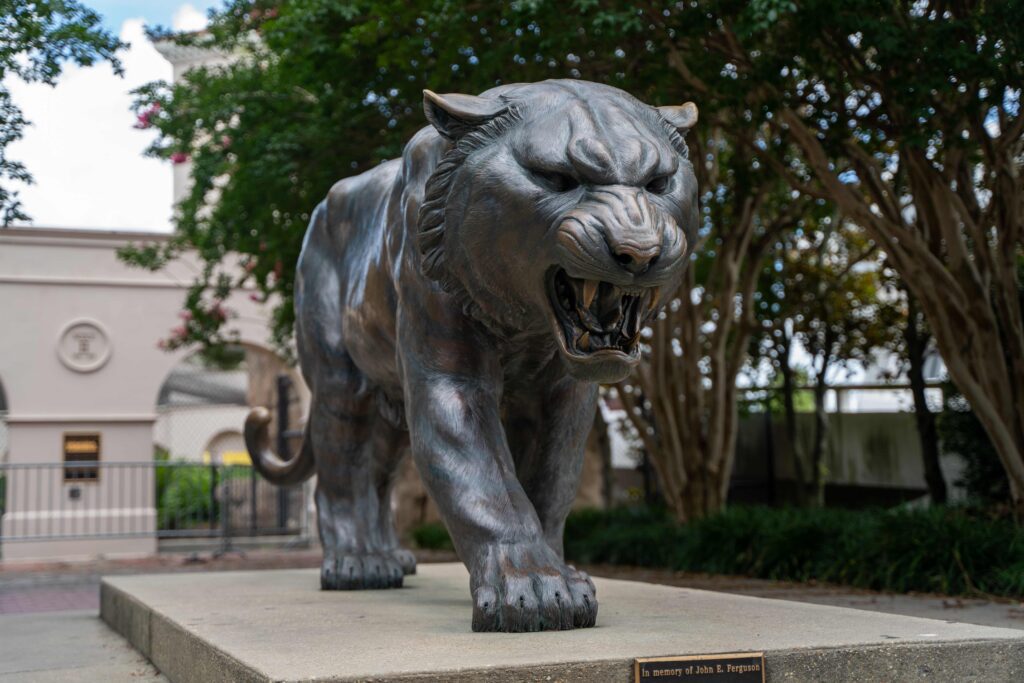
As a leading research university in Baton Rouge, LSU is among the best colleges without supplemental essays. No matter their major, every student is able to participate in research opportunities. LSU ’s emphasis on research is a crux of the community as it comes from a drive to improve the world.
18. University of Alabama
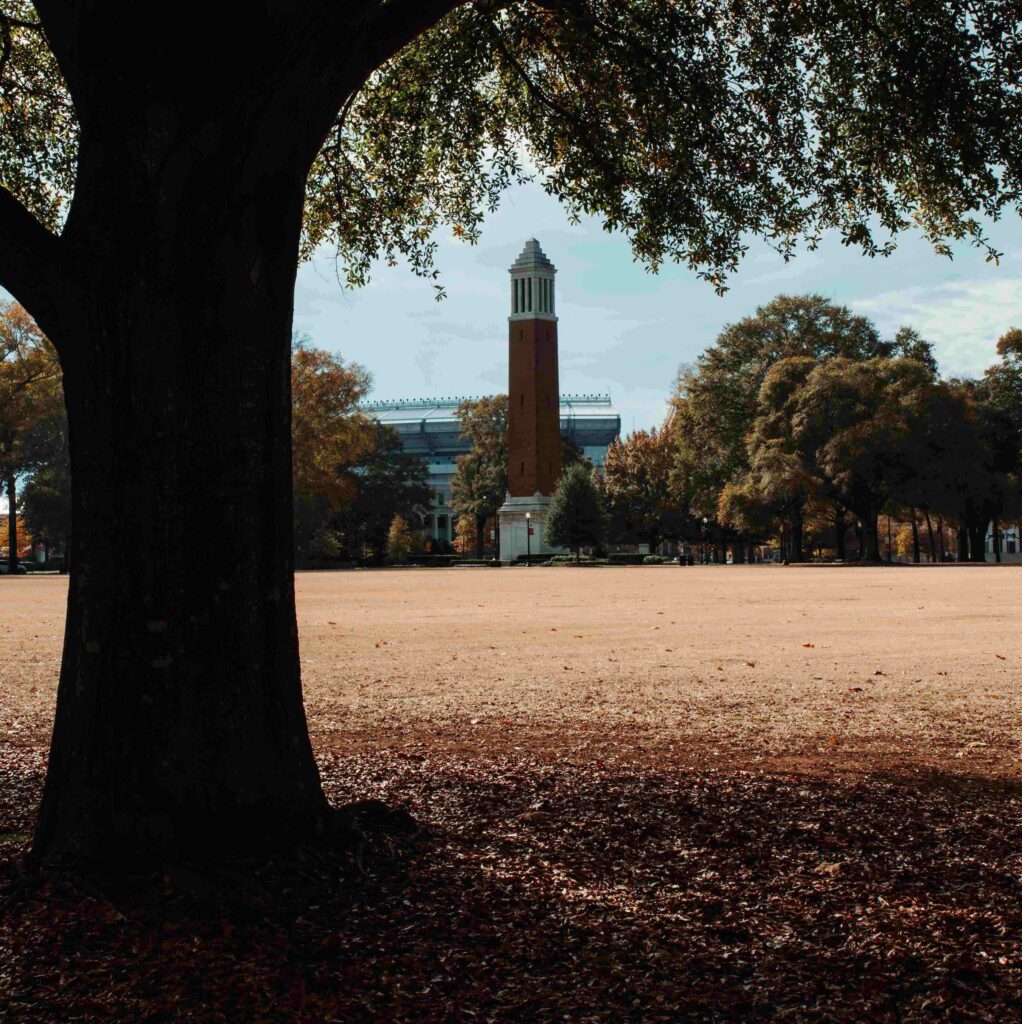
With over 100 areas of study in 8 schools and colleges, the University of Alabama provides students with ample options. At the University of Alabama, research is highly valued, but students are ultimately encouraged to pursue their passions. Check out the freshman requirements to learn more about applying.
19. University of Cincinnati

Another large public research university makes our list of colleges without supplemental essays. UC has excellent co-op and internship programs from which students can gain practical professional experience while studying. University of Cincinnati students will gain an excellent education and hands-on experience.
20. Clemson University

Clemson admissions prides itself on the university’s tireless work ethic. Through this, they encourage their students to “change lives, change perceptions, and…to change the world.” Students willing to work hard to achieve their future goals should check out the application requirements . Clemson admissions falls in the middle when it comes to selectivity. The Clemson admissions rate is 49% . Logically, we can see from the Clemson admissions rate that nearly half the students that apply will gain admittance.
21. University of Pittsburgh

Located in the heart of the city, the University of Pittsburgh is among the top colleges without supplemental essays. This large public university focuses on innovation as a path to positive change. With a prime location, students are encouraged to take advantage of all that the university and city have to offer.
22. Wesleyan University

Forming students to be “intellectually agile” is a huge part of the Wesleyan curriculum. With 45 majors to choose from, students are encouraged to take advantage of the large range of available courses. Additionally, there are over 5,000 internships opportunities available starting from your first year on campus.
23. Miami University

You may have seen this school ranking in the top 50 public universities in the US. There’s certainly no doubt that Miami University in Ohio is one of the best colleges without supplemental essays. With many dynamic undergraduate programs available, students will be able to pursue a wealth of careers in their chosen fields. An active student body helps in forming a strong campus community in a location brimming with natural beauty.
24. University of Connecticut

As a large university with a rural location, the UConn campus community is like a small town of its own. Students can enjoy a wide range of study options, ample student organizations and clubs, and renowned leaders as faculty members. Learn more about the application requirements.
25. University of Delaware

The beautiful campus and experienced faculty of the University of Delaware provide for about 18,000 students. Through research, internships, and study abroad opportunities, students are encouraged to find their authentic way of changing the world.
26. Florida State University

FSU is one of the best value colleges without supplemental essays. Students here are intellectually curious, academically driven, and socially conscious. The FSU experience is centered around providing students with the tools to achieve their goals.
27. University of Georgia

Even though this is a large university, students are seen as “the individual they are.” The University of Georgia is committed to accessibility and inclusion. Additionally, 92% of the university’s graduates are employed or continuing their studies within six months of graduation.
28. University of Houston

As the third largest university in Texas , the University of Houston is one of our top colleges without supplemental essays. As a diverse campus community, the university aims to change lives and communities for the better. It emphasizes discovery and conversation as a foundation for students’ development.
29. Indiana University – Bloomington

The possibilities are endless when you study at Indiana University Bloomington . Students will gain hands-on experience in their field either in the lab or on the ground. Furthermore, students have the opportunity to learn from faculty who are renowned in their discipline.
30. University of Kansas

There is certainly no lack of options when studying at the University of Kansas . There are over 400 degree and certificate programs to choose from spread out over 14 schools. Innovation, research, and the pursuit of knowledge are pillars of the UK educational experience.
31. University of Kentucky

Another UK makes our list of colleges that don’t require supplemental essays. The University of Kentucky offers over 200 degree programs in 16 schools. One of the university’s main values is finding ways to advance Kentucky—from education, to health, economy, and culture— to ensure its progress.
32. University of Massachusetts Amherst

Located in an ideal college town, UMass Amherst is the largest public research university in New England. The school offers over 110 majors on campus. In addition, students are encouraged to be curious explorers through study abroad opportunities.
33. University of Minnesota – Twin Cities

This large university with a city campus encourages students to discover the unknown. Whether it’s through internships or research opportunities, students are challenged to pursue their interests and push their academic limits. Learn more about the application requirements to get started.
As you review this list, please note that college essay requirements are subject to change. With this in mind, make sure to visit each school’s admissions website to confirm all supplemental essay requirements.
It may seem alluring to apply only to these colleges that don’t require essays. However, keep in mind that these institutions place more importance on GPA and extracurriculars. So, when considering applying to schools without supplemental essays, think about these factors. Will your application narrative be impactful to admissions teams without additional essays? Will your personality and values shine through?
What is the best school that doesn’t require supplemental essays?

Looking at the acceptance rates of the colleges that don’t require essays, we can determine which schools are the most selective. In this case, Colby College ( 9% ), Grinnell College ( 11% ), and Middlebury College ( 13% ) have some of the most selective acceptance rates. However, the Bates College acceptance rate also makes it quite selective. In fact, the Bates College acceptance rate is similar to that of Northeastern University.
The best colleges without supplemental essays will vary depending on what you’re looking for. So, how can you determine your top colleges without supplemental essays? Well, when making your college list you should consider factors such as majors, location, size, and campus culture. This will help you focus your college search on a few key criteria.
Firstly, make a list of what you want in your university. For example, do you want to go to school in a large city? Are internship or co-op programs important to you? Is your major available, and are you intrigued by its curriculum? Ideally, you want to be excited imagining yourself on a college’s campus. As you think about your college list priorities, you’ll be better able to identify which university is best for you. In fact, you may have already started by determining you want to look at colleges that don’t require essays!
College Application Requirements: Beyond Essays
Coming up with college essay ideas might be one of the biggest stressors in the college application process. And yet, there is certainly much more to completing an application than just essays. Colleges that don’t require essays still have other requirements that applicants will need to send by the school’s application deadlines .
For example, let’s look at Colby admissions, which features on our list of colleges that don’t require essays. The Colby admissions site states the application requirements are the completed application, academic records, and financial aid application. Non-native English speakers may also be required to submit a language proficiency certification.
Additionally, there are optional materials you can add to enhance your application, which vary from school to school. Colby accepts standardized test scores , additional recommendation letters, an arts supplement, and an “elevator pitch” video.
Of course, these are just application requirements outlined by Colby admissions. Drexel admissions, Clemson admissions, and any other college admissions office will have other—often similar—application requirements. When comparing colleges to add to your college list, these requirements will likely be an important factor.
Students can usually count on the following materials being required during the application process:
- Completed application
- Academic records
- Teacher/counselor letters of recommendation
- Language proficiency exam (where applicable)
Many schools are continuing test-optional policies first instated due to the COVID-19 pandemic. However, some do require standardized testing scores as well. Always check the admissions site for the application requirements and deadlines. For example, Colby and Drexel admissions have slight differences in their requirements, even though they’re both colleges that don’t require essays. Always confirm requirements on admissions websites!
How to make your college application stand out!

Even when applying to colleges that don’t require essays, you still need to carefully craft a compelling application narrative. Creating a cohesive application narrative or personal brand during the college application process can be tricky. Ideally, your application should tell the story of who you are and what drives you, both academically and personally. You’ll show this through your grades, courses, achievements, and extracurricular activities .
Regardless of other college essay ideas you need, you will need to write the Common App personal statement. This is the only significant writing the admissions teams will see from applicants at colleges that don’t require essays. In light of that, it needs to be an excellent example of your writing skills while also demonstrating your personality.
The Common App provides students with a few college essay topics to choose from. In order to generate the best college essay ideas, choose to write on college essay topics that genuinely excite you. While brainstorming , make a list of college essay ideas from the given college essay topics. Think about anecdotes, meaningful experiences, and personal growth that pertain to the college essay topics. Successful college essay ideas lead to authentic essays, which is the key in standing out to admissions.
Essay Guides and Essay Resources
As we’ve mentioned, even when applying to colleges that don’t require essays, most applicants must complete the personal statement. Don’t stress about coming up with college essay ideas on your own! CollegeAdvisor.com provides ample free resources for students at every step of the college application process—including the essays.
Unfortunately for those aiming to apply to colleges that don’t require essays of any kind, most require the personal statement. The best way to generate college essay ideas is by reading successful essay examples. Check out some of these Common App essay examples to understand what works. And, before even worrying about college essay ideas, learn more about the Common App essay in this article . We’ll outline the most important factors when writing this essay.
If you’re reading this, you probably want to apply to colleges that don’t require essays. However, don’t let that limit you in the college application process. If you love a school, but they require supplemental essays, keep it on your list. Don’t let a disdain for essays keep you from attending your dream school .
CollegeAdvisor has many school-specific essay guides covering everything from college essay ideas to revising that final draft. Check out our USC , Yale , UChicago , and many more college-specific supplemental essay guides. If you’re stuck on thinking up college essay ideas, then these guides are a good place to begin.
Colleges Without Supplemental Essays – Final Thoughts
Without a doubt, supplemental essays are one of the most stressful parts of the college application process for many students. From choosing college essay topics to generating college essay ideas and actually writing essays, there’s a lot of effort involved.
However, as you can see from this article, there are many colleges that don’t require essays. So, if you’re crunched for time or feel overwhelmed by needing various impactful college essay ideas, you have options. It’s never a bad idea to add some schools that don’t require essays to your college list.
Keep in mind, though, that you’ll most likely still need to write the personal statement essay. But one essay is better than six. And, remember that CollegeAdvisor can provide personalized attention for anything from brainstorming college essay ideas to applying for financial aid. Reach out if you’d like some guidance in your college application process. Otherwise, take advantage of our large library of free resources!

This article was written by Sarah Kaminski. Looking for more admissions support? Click here to schedule a free meeting with one of our Admissions Specialists. During your meeting, our team will discuss your profile and help you find targeted ways to increase your admissions odds at top schools. We’ll also answer any questions and discuss how CollegeAdvisor.com can support you in the college application process.
Personalized and effective college advising for high school students.
- Advisor Application
- Popular Colleges
- Privacy Policy and Cookie Notice
- Student Login
- California Privacy Notice
- Terms and Conditions
- Your Privacy Choices
By using the College Advisor site and/or working with College Advisor, you agree to our updated Terms and Conditions and Privacy Policy , including an arbitration clause that covers any disputes relating to our policies and your use of our products and services.

Choose Your Test
Sat / act prep online guides and tips, 64 great colleges that don't require essays to apply.
College Info , College Essays

If the thought of writing a college essay fills you with terror, you might be wondering: are there any colleges that don't require essays?
The answer is yes, there are! This guide will give you an overview of colleges that don't require admissions essays, how to find these schools, and whether you should apply to one or not. We'll wrap up with a list of 64 colleges with no essay requirement that you can apply to.
Why Do Some Colleges Not Require an Essay?
In general, college essays help schools get a sense of you as a person—beyond your academic record, GPA, and test scores. They give you a chance to clearly articulate your goals and also give admissions officers a better idea of how you'll fit within the school's community. Finally, essays are helpful because they provide schools with concrete evidence of your writing ability.
However, there are many colleges that don't require essays for admissions. What are some reasons why? Let's take a look at the three biggest ones:
#1: Limited Resources
It takes a lot of admissions officers' time and energy to read and evaluate college essays.
At smaller schools with fewer resources, and even at larger schools that enroll tens of thousands of students, the resource costs associated with reading each essay for every single student might outweigh the benefits of getting additional information on applicants beyond GPAs, test scores, and transcripts.
Schools sometimes balance these concerns by requiring essays only for the most competitive programs (usually things such as engineering and nursing) or for scholarships, for which the additional information might be more instrumental in making decisions.

They need to use those limited resources for coffee.
#2: Specific Admissions Cutoffs/Criteria
Many colleges, particularly public schools, admit students based on a type of selection index, which tabulates some combination of GPA, test scores, and/or class rank.
If students meet the minimum index score cutoff, they will be admitted. In this case, the school might simply feel that additional information from an essay isn't necessary for making a decision regarding whether a student will be successful or not.
Selection indices are also often different for in-state and out-of-state students, with the latter being subject to more stringent academic criteria.
In addition, the selection index is sometimes used for scholarships, with students with higher index scores being awarded more money.
Schools with selection indices do often require or recommend college essays for borderline candidates so that students can provide additional information on why they'd be a good fit at the school in spite of not meeting the stated academic criteria.
#3: Make Admissions Process Easy and Appealing
Some colleges hope that by making the admissions process easy and requiring only a transcript, test scores, and basic demographic information, they'll attract a wider variety of applicants.
By presenting their application process as a simple alternative to more intensive processes that require letters of recommendation, essays, and so on, they can attract students who are on the fence about applying to college at all .
They could even potentially motivate highly qualified applicants to use them as one of their safety or match schools because the students won't need to write additional essays or do extra work to apply.
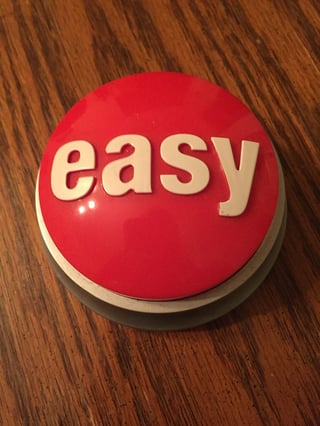
Some applications seem like you just have to click to apply!
How to Find Colleges That Don't Require Essays
There are over 4,000 postsecondary educational institutions in the US, and over 80 of these schools don't require essays for admission.
If you want to know whether a particular school requires an essay for admission, Google "[School Name] freshman admission requirements" or "[School Name] admissions essay." This should pull up pages from the school's official website, with links to guidelines on admission essays.
If, however, you're looking more generally for schools that don't require essays, you can check out our list of 64 schools below or try one of the following starting places:
Public Universities in Your State
A significant number of public universities don't require essays for admissions.
Even if the major public schools in your state (such as the University of Illinois Urbana–Champaign or UCLA) require essays for admission, you might find that the smaller campuses and smaller or more specialized state schools might not require essays. So be sure to check those out!
You can actually get a pretty robust list of schools in your state by simply Googling "[State Name] colleges." Do this and a list of colleges will appear across the top of your screen. Thanks, Google!
Schools With Automatic Admissions Criteria
A school that has criteria for automatic admission (e.g., if you live in-state and have a particular class rank, GPA, and/or test score profile) might not require applicants who meet the automatic criteria to submit essays with their applications.
However, don't assume that just because you meet automatic admissions criteria that you won't need to write an essay.
At UT Austin, for example, all students must submit an essay , regardless of whether they meet the automatic admissions criteria. Although you could probably write just a straightforward paragraph in the essay section and still get admitted (since you meet the criteria), you'd likely be hurting your scholarship potential, not to mention jeopardizing your chances of being let into your desired major.
Small Private Liberal Arts Institutions
Another group of schools that might not require essays are smaller, private liberal arts institutions. These types of schools often serve a fairly niche market and might simply not get a high enough application volume to need essays to differentiate applicants.
Community Colleges
Local community colleges do not require essays for enrollment, since most allow anyone to enroll. Some even have automatic transfer agreements with local four-year universities. However, if you want to transfer to a particular four-year university after you finish at a community college, you might very well have to write an essay—so you could just be putting off the inevitable!

You can find a lot of no-essay colleges for your basket!
Complete List: 64 Colleges That Don't Require Essays
The following chart contains 64 colleges with no essay requirement, organized by state.
Note that these are far from the only no-essay college applications —just some of the most notable. Follow our guidelines above for finding additional essay-free colleges.

Should You Apply to a College That Doesn't Require an Essay?
If you're reading this article, you're clearly worried about writing application essays for one reason or another. Maybe you're concerned about having enough time to finish everything. Or maybe you think your writing is terrible.
Here are some reasons to write college essays in spite of your misgivings:
#1: You Want to Apply to the Most Selective Schools
If you're hoping to apply to the most selective schools , you'll almost certainly have to write at least one essay. The most highly ranked no-essay school that I could find was the University of Pittsburgh—a great school. But if you're going for UChicago , MIT , Stanford , or an Ivy League-level school , you'll have to write an essay.
#2: You Want a Scholarship
Even if you do apply to a school that doesn't require an essay, you might still have to write an essay if you want to apply for the most competitive scholarships .
#3: You Have Special Circumstances to Explain
If you have any kind of special circumstance to explain—say, a dip in your grades one year due to a family illness—you definitely want to write about it in an essay. This will help you compensate for any perceived deficits in your academic record and also prevent you from being penalized in the admissions process for the vagaries of life.

There's value in telling your story to the admissions committee.
#4: You're a Good Writer
I'm thinking that most strong writers are going to actively want to write college essays, but just in case: if writing is one of your strengths, definitely write an essay. You want to show off your best qualities to admissions officers, after all! If your primary concern is time, use something like the Common Application so you don't have to write a new essay for every school.
#5: The Essay Prompt Is Short
Some college essays are barely essays at all. Some required essays have just a 250-word limit, and 500 words is pretty standard. For reference, the first section of this article—"Why Do Some Colleges Not Require Essays?"—is about 450 words, including sub-headings. That's not so bad!
#6: You Can Get Help
Although it's important that your college essays are your own work, you're allowed to get help with them! Colleges expect you to put your best foot forward, so if that means discussing ideas with parents and teachers, and having someone else look over your rough drafts and offer suggestions, that's completely fine. You don't have to go at it completely alone.
#7: You Can Reuse an Essay for All Your Schools
For schools that use the Common App , Coalition App , or Universal College App , you can generally use one essay for all your colleges. Some schools might require additional supplemental essays, though, so be sure to look that up in advance to avoid being blindsided later.
So Should I Write an Essay?
If it happens that all the schools you want to apply to don't require essays, then great! But overall, I'd say don't let the fact that a school has one (or even two) essays stop you from applying if you're genuinely interested in going there.
If you find writing essays stressful or if you're time-limited, there's nothing wrong with using some strategies to limit the number of polished essays you need to produce (such as using the Common App) and applying to a mix of essay and no-essay schools.
Key Takeaways: Colleges That Don't Require Essays
There are actually tons of colleges that don't require essays. Here are some common reasons why a college might not require an essay:
- Limited resources—it takes a lot of time and effort to read an essay by each applicant
- They might have certain GPA and/or test score admissions criteria and feel as though the information provided by an essay isn't necessary
- To make it more appealing to students by having an easier application process
So how can you find college applications without essays? Here are some places to start:
- Public schools in your state, especially smaller ones in case the bigger ones do require essays
- Schools with automatic admissions criteria—if you qualify for admission, you might not need to write an essay
- Smaller liberal arts institutions
- Community colleges
When it comes down to it, though, should you apply to colleges with no essay requirement? Here are some reasons you might want to write a college essay, even if you're apprehensive:
- The most selective colleges usually do require essays
- Scholarship applications for particular schools often require essays
- If you have special circumstances to explain, plan on writing an essay
- Strong writers should write essays to put their best foot forward
- Word limits are often very short—think 250-500 words (that's just a few paragraphs!)
- You're allowed (and encouraged) to get help with brainstorming ideas and revising drafts
- If you use an application system that can send applications to multiple schools, such as the Common App, Coalition App, or Universal College App, you might be able to write just one essay for all the schools you're applying to
Don't forget to also check out our list of 64 colleges that don't require essays!

No essay, no tears!
What's Next?
Need more help looking for colleges? See our step-by-step guide to college research . Also, check out how to decide where to go to college and the difference between a college and a university !
Decided to write an essay after all and need some help? Check out our comprehensive guide to writing a college essay and our guide to writing the "why this college" essay . Be sure to avoid these 10 college essay mistakes , too.
Want to improve your SAT score by 160 points or your ACT score by 4 points? We've written a guide for each test about the top 5 strategies you must be using to have a shot at improving your score. Download it for free now:

Ellen has extensive education mentorship experience and is deeply committed to helping students succeed in all areas of life. She received a BA from Harvard in Folklore and Mythology and is currently pursuing graduate studies at Columbia University.
Student and Parent Forum
Our new student and parent forum, at ExpertHub.PrepScholar.com , allow you to interact with your peers and the PrepScholar staff. See how other students and parents are navigating high school, college, and the college admissions process. Ask questions; get answers.

Ask a Question Below
Have any questions about this article or other topics? Ask below and we'll reply!
Improve With Our Famous Guides
- For All Students
The 5 Strategies You Must Be Using to Improve 160+ SAT Points
How to Get a Perfect 1600, by a Perfect Scorer
Series: How to Get 800 on Each SAT Section:
Score 800 on SAT Math
Score 800 on SAT Reading
Score 800 on SAT Writing
Series: How to Get to 600 on Each SAT Section:
Score 600 on SAT Math
Score 600 on SAT Reading
Score 600 on SAT Writing
Free Complete Official SAT Practice Tests
What SAT Target Score Should You Be Aiming For?
15 Strategies to Improve Your SAT Essay
The 5 Strategies You Must Be Using to Improve 4+ ACT Points
How to Get a Perfect 36 ACT, by a Perfect Scorer
Series: How to Get 36 on Each ACT Section:
36 on ACT English
36 on ACT Math
36 on ACT Reading
36 on ACT Science
Series: How to Get to 24 on Each ACT Section:
24 on ACT English
24 on ACT Math
24 on ACT Reading
24 on ACT Science
What ACT target score should you be aiming for?
ACT Vocabulary You Must Know
ACT Writing: 15 Tips to Raise Your Essay Score
How to Get Into Harvard and the Ivy League
How to Get a Perfect 4.0 GPA
How to Write an Amazing College Essay
What Exactly Are Colleges Looking For?
Is the ACT easier than the SAT? A Comprehensive Guide
Should you retake your SAT or ACT?
When should you take the SAT or ACT?
Stay Informed
Get the latest articles and test prep tips!
Looking for Graduate School Test Prep?
Check out our top-rated graduate blogs here:
GRE Online Prep Blog
GMAT Online Prep Blog
TOEFL Online Prep Blog
Holly R. "I am absolutely overjoyed and cannot thank you enough for helping me!”
How to Find and Apply for Scholarships
College board scholarship search, what are scholarships .
Scholarships are a type of financial aid commonly referred to as “free money” or “gift aid.” Scholarships usually require an application and are often awarded to students based on a combination of factors including merit. Merit scholarships tend to have specific requirements and are awarded to applicants based on certain skills and accomplishments and may not be based on financial need. Scholarships may be renewable, meaning you can receive scholarships for more than one year. A new application may be required along with maintaining certain eligibility requirements, such as GPA or a certain major.
Why do I need scholarships?
Scholarships are a great type of financial aid because they do not have to be repaid. Receiving scholarships can help cover the remaining bill and indirect costs, while also minimizing the amount you need to borrow in loans while in college.
What are some common scholarship application requirements?
Many scholarships require similar application materials, which commonly include:
- The application, which can be paper or an online form.
- Essays, often personal statements, that provide insight into your activities inside and outside the classroom.
- Letters of recommendation from teachers, coaches, guidance counselors, community members, or other mentors.
- Honors or awards you have received, academic or otherwise.
- Information about your high school or college, which may include your transcript, GPA, Student Aid Report, or financial aid offer.
- A résumé that includes any employment, volunteer, or extracurricular experiences.
Specialized scholarships may require additional information and may have a priority deadline. For example, scholarships supporting the arts may require portfolios or writing samples. Be sure to read each application thoroughly for requirements so you don’t miss any.
What should I do before college to increase my chances?
Since many scholarships are merit based, maintaining good grades and increasing your involvement in school and community activities are important. Some scholarships have GPA requirements, so keeping your grades up will help open more opportunities. Additionally, many applicants with varied extracurriculars and volunteer or job experiences may stand out. The more scholarships you’re eligible for and apply for, the better the odds you have of receiving one.
What are the best ways to find and receive a scholarship?
There is no guarantee that you’ll receive a scholarship, but there are a few things you can do to increase your chances while applying. One of the most important things to remember is that the scholarship committee wants to get to know you through the applications—you want to show why your college education is worth investing in.
There are a few things that you can do to increase your chances, including:
- Start early and search year-round: No matter what stage in the college process you’re at, you should start looking for scholarships now. There are even scholarships that high school students can receive before senior year. Scholarship deadlines vary, so setting some time aside every few weeks to search and apply will open up more opportunities of securing a scholarship.
- Use the right search engine: Finding scholarships to apply for can be difficult, but with the right search engine you can narrow your search and find scholarships you’re eligible for. BigFuture’s scholarship search is a great resource to use.
- Find a balance: You should apply for several scholarships—the more you apply for, the better your chances of receiving one. However, it’s important to use your time wisely. You should only apply for those you’re eligible for, based on the requirements.
- Research local scholarships: Local scholarships tend to have fewer applicants, meaning you may be more likely to get them. Your high school counselor or college financial aid department might have insight about where to find and apply for local scholarships. Be sure to talk to others in your community, and check with local businesses and organizations like banks and churches.
How do I know a scholarship is legit?
While plenty of legitimate scholarships are available, some fake scholarships are set up to scam students out of money or personal information. Using reliable search engines, like BigFuture, can help avoid this. Scholarships should always be free to apply. Some may ask for your bank account information after choosing you as a recipient, but they should not ask for this information as an application requirement. If you’re unsure, contact the organization or company providing the scholarship to ensure they are legit.
Finding and applying to scholarships sounds like a lot of work—how can I make this process easier?
Because scholarships don’t need to be repaid, they can be an important part of making college affordable. However, we know that it might not always be feasible to spend a lot of time applying. There are a few things you can do to simplify the process and save time where possible.
- Start early: Prioritize getting two or three letters of recommendation, and write your essay/personal statement before you start searching to help save time.
- Time management: Plan to spend a day or two a month searching and submitting applications with your prepared materials to avoid last-minute applications, missed deadlines, and stress.
- Stay organized: Collecting and organizing your application materials and tracking due dates will help you stay on track and avoid missing out on opportunities.
- Reuse essays when possible: Many scholarship essay topics are similar, so editing one of your previously written essays to fit the scholarship you’re applying for can save you time.
With these tips and resources, you’ll be better prepared for scholarship applications and increase your chances of receiving scholarships to help cover your college costs. Check out your chance to earn $500 and $40,000 scholarships in monthly drawings offered by BigFuture to students who complete the steps to plan for college .
Related Articles
$2,000 No Essay Scholarship
Help cover the cost of college without writing a single essay!
Niche is giving one student $2,000 to put toward tuition, housing, books or other college expenses — no essay required.
Apply below for your chance to win so you can focus on your education, not your finances. Good luck!
Min 7 characters
By proceeding you acknowledge and agree to our Privacy Policy and Terms of Use .
By proceeding you acknowledge and agree to our Privacy Policy and Terms of Use and Scholarship Rules .
Who Can Apply
All high school and college students, as well as anyone looking to attend college or graduate school in the next year. Please note: Not everyone is eligible for this scholarship. Niche sponsored scholarships and sweepstakes are for people with US citizenship or a valid Visa/US passport only. Read the scholarship rules for full eligibility requirements.
How It Works
The $2,000 “No Essay” Scholarship is an easy scholarship with no essay required! Only one entry allowed per person. The winner will be determined by random drawing and then contacted directly and announced in Niche's email newsletter and on the Scholarship Winners page.
About Niche scholarships
We believe cost shouldn’t keep anyone from pursuing a higher education, so we connect students with thousands of scholarships — many of which don’t require an essay — to help them afford college. In 2023 alone, we offered over $285,000 in Niche scholarships. Read more about Niche scholarships here or visit our FAQs .
Some top schools are bringing back ACT and SAT requirements — but most colleges are still test-optional. Here's what you need to know.
- Some colleges that were test-optional during the pandemic are requiring SAT or ACT scores again.
- Those schools have said that having scores will help them recruit a more diverse student body.
- Still, the majority of colleges in the country are remaining test-optional.

Some colleges are bringing standardized testing requirements back to their admissions processes after nixing them during the pandemic.
But they're still not in the majority.
Since the start of 2024, some prestigious schools announced they will once again require SAT or ACT scores in prospective students' applications. Dartmouth, for example, announced in February that while it took on the "test-optional" policy in response to the pandemic, it will be reinstating the testing requirement for the class of 2029.
"Our bottom line is simple: we believe a standardized testing requirement will improve—not detract from—our ability to bring the most promising and diverse students to our campus," the university said in a statement.
Yale and Brown made similar announcements, saying they conducted studies that found requiring testing allowed them to attract the most diverse student body.
"Our analysis made clear that SAT and ACT scores are among the key indicators that help predict a student's ability to succeed and thrive in Brown's demanding academic environment," Brown's Provost Francis Doyle said in a statement.
However, these elite schools are still outnumbered by the colleges that decided standardized testing stood in the way of otherwise-qualified applicants. According to the National Center for Fair and Open Testing, more than 80% of colleges will be test-optional for fall 2025 admissions.
"Test-optional policies continue to dominate at national universities, state flagships, and selective liberal arts colleges because they typically result in more applicants, academically stronger applicants and more diversity," FairTest Executive Director Harry Feder said in a statement.
The pros and cons surrounding standardized testing have been long-debated . While some argue the tests can put lower-income students at a disadvantage because they might not have access to the same tutoring resources that wealthier students have, others argue the tests give students from all backgrounds a way to show their skills — and give schools an easy way to choose who they should admit.
Dominique Baker, an associate professor at the University of Delaware who researches education policy — primarily financial aid and admissions policies — told Business Insider that the schools that are reinstating testing requirements right now didn't choose to go test-optional because they thought it was "a good policy decision." The pandemic forced them to do so because students couldn't get to testing sites, and that's no longer an issue.
"The institutions we're currently talking about, they're requiring tests again and didn't necessarily want to ever stop requiring tests," Baker said. "That matters."
Related stories
Here's what students should know about the schools changing their policies this year — and what it could mean for them.
The return of some testing requirements
While many of the Ivy League schools that are reinstating testing requirements cited their aim to help broaden diversity on campus, some other schools have put forth slightly different reasons for their shift in policies.
The University of Texas-Austin, for example, announced its reinstatement of testing requirements in March after shifting to test-optional during the pandemic. Its reason: requiring testing scores would help the school choose between many high school seniors with high GPAs.
"Our experience during the test-optional period reinforced that standardized testing is a valuable tool for deciding who is admitted and making sure those students are placed in majors that are the best fit," the university's president Jay Hartzell said in a statement. "Also, with an abundance of high school GPAs surrounding 4.0, especially among our auto-admits, an SAT or ACT score is a proven differentiator that is in each student's and the University's best interest."
However, other schools that adopted test-optional during the pandemic have chosen to maintain the practice. The University of Michigan, for example, announced in February that it would be formally adopting a test-optional admissions policy. It said that since the fall of 2020, the school saw "a significant increase in applications from students from all backgrounds," suggesting that a test-optional policy opened the door for a more diverse student body.
What it means for schools and students
One reason some schools have wanted to maintain test score requirements, Baker said, is because of their link to financial aid. While some financial aid is need-based — or based on a student or family's income level — a college can choose to award aid based on merit, which it evaluates using a student's GPA or test scores.
"Frequently, the most generous state financial aid that those states offer require test scores. And so what the state could do is they could say, 'We did a really short pause, but now we're going back to requiring test scores for these financial aid pieces,'" Baker said. "And state legislatures could also encourage institutions to go back to requiring tests. So I also think that there is a role that politics plays within this."
On top of that, the wide range of testing policies can be confusing for students. For many schools, the two test-optional and testing-required categories are just umbrellas — there can be different policies within each college, like requiring tests for an honors program but not for regular admission.
Even so, data has shown students have continued to take tests despite applying to schools with test-optional policies. According to the College Board, 1.9 million students in the high school class of 2023 took the SAT at least once, an increase from 1.7 million in 2022.
Moving forward, Baker said it's important that if more schools choose to switch their testing policies, they consider the announcement's timing.
"The more times you take the test, the better your score is. So if an institution announces in February or March that they're going to be requiring tests for the fall, then students really do not have a ton of time to take them," Baker said. "And so I do think that the timing of the announcement and the timing of when the policy takes effect really, really matter."
Watch: Why student loans aren't canceled, and what Biden's going to do about it
- Main content

‘Total Disgrace’: Anger, Frustration as Mass Heating Failures Across Russia Leave Thousands in the Cold
P ODOLSK, Moscow region – Residents throughout Russia affected by unprecedented winter heating outages in recent days have expressed their frustration and urged local authorities to restore heating in their homes.
In Podolsk, a town some 30 kilometers south of the capital Moscow, at least 149,000 residents — nearly half of its population — were left without heating when a heating main burst at a nearby private ammunition plant.
“It’s a total disgrace. There is no heating and no hot water. We have to sleep in sleeping bags,” Yuri, a local resident, told The Moscow Times.
“I have no words to describe how bad the situation is," said Yuri, who declined to provide his surname. "We have had no heating for almost six days."
Heating issues have affected residents in the Moscow region, where temperatures have plunged to as low as minus 20 degrees Celsius in the past week, as well as people in the Far East Primorye region , the cities of Moscow and St. Petersburg , Penza , the southern Voronezh and Volgograd regions and more.
In the Tver region, a group of residents filmed an appeal to President Vladimir Putin, saying that they “are freezing from the cold” in the village of Novozavidovsky.
“We're literally being killed by the cold,” a woman in the video said, adding that they have been sending requests to local authorities since September after their houses were connected to a boiler room whose power was reportedly insufficient.
“This is some kind of torture and extermination of the population 100 kilometers from Moscow,” she added.
Residents of the Moscow region town of Elektrostal lit a fire in the street to draw the authorities’ attention to the heating problem.
“It’s impossible to stay in our houses. We're freezing!” a group of women in the video said.
Suffering from subzero temperatures, residents are placing the blame on local authorities and utility services for failing to take necessary precautions and not taking action to resolve the situation.
“We are sending complaints everywhere but no one listens to us. We have portable heaters working in every room, but the temperature inside is still 10 degrees Celsius,” Yelena from Podolsk said.
“There is a clinic and a hospital, as well as kindergartens, where there is no heating. And we have no answers, no assistance, no explanation,” Yelena added.
Podolsk authorities opened temporary heating centers and declared a state of emergency.
Local authorities linked the heating problems to the fact that the town is heated by a boiler plant owned by the Klimovsk Specialized Ammunition Plant, a private ammunition factory and one of the largest weapon cartridge production enterprises in the country.
“The facility is under tight security conditions, which limits our ability to oversee winter preparations,” the Moscow region’s Vice Governor Yevgeny Khromushin said last week. “We were unaware of the problem for nearly a day.”
An unidentified Moscow region official and two senior executives at the plant were arrested on suspicion of providing unsafe services, Russia’s Investigative Committee, which probes major crimes, said in a statement Tuesday.
Investigators said that Podolsk’s deputy mayor was accused of misusing authority by issuing a readiness certificate for the boiler house at the plant.
In the neighboring Tver region, the authorities opened a criminal case over the laundering of over 84 million rubles ($938,993) in heating bills paid by residents, the Astra Telegram channel reported this week, citing unidentified sources. According to investigators, the heads of the local water intake and boiler house misappropriated the heating payments for personal use.
Reacting to the heating failures, Putin on Tuesday asked Emergency Situations Minister Alexander Kurenkov to provide heat and electricity to the affected residents.
The outages appear to be the latest effect of several decades of crumbling infrastructure in Russia which have been linked to endemic corruption and mismanagement.
The overall decay of Russia's municipal infrastructure surpassed 70% in 2022, the pro-Kremlin newspaper Izvestia reported .
According to Sergei Pakhomov, head of the State Duma’s Construction, Housing and Utilities Committee, water pipes that were 90 years old or even older were still in use as recently as two years ago in some cases.
Housing, utilities and communal services are a common source of problems for Russians during the winter.
In St. Petersburg, residents regularly complain about extensive ice coverage on city streets and sidewalks, with many people ending up in the hospital over the years due to slipping and falling accidents.
In the Siberian republic of Khakassia, two villages were left without electricity last month due to apparent issues with outdated communication systems.
In the winter of 2020, five people in the Perm region were killed after a pipe burst.
When asked about the latest heating outages, Kremlin spokesman Dmitry Peskov acknowledged the problems and linked them to poor municipal infrastructure, saying that people “had to endure a lot of inconvenience in the cold and without electricity.”
"Despite all the titanic efforts to update all housing and communal services systems, there's still a certain part that remains considerably deteriorated. These programs will continue, but it is impossible to update all pipes and all housing and communal services systems in 10-15 years,” Peskov said.
As for now, residents affected by heating issues appear to lack optimism that the problems will be solved efficiently.
"It's been a week since we've had heating, and the temperature in my apartment is around 11 degrees Celsius,” Podolsk resident Lidiya told The Moscow Times.
“Unfortunately, no one knows when it will be repaired,” she added.

Take an IELTS test in or nearby Moscow
Are you preparing to take an IELTS test in or nearby Moscow, Russia? You can find all the IELTS test dates and test locations here on admissiontestportal.com. Click on "Check availability" to access all available IELTS exams in Moscow and register to save your spot within a couple of minutes. Continue reading
BKC-IH Moscow
Test dates are subject to availability. Please check real-time availability on the British Council Online Registration System. More information

We're offering you a GREAT REDUCTION
BKC-IH Obninsk
Bkc-ih kaluga.
Other test centres in or nearby Moscow
- Students International Vladimir
- Students International - Nizhny Novgorod
- Students International - Voronezh
About the city of Moscow
There are test locations in Moscow offered and certified by British Council. The test fee specified for the exam locations above is indicative and can vary depending on test date, test location and test type. Please visit the test location website for most recent information.
Make sure to prepare for the IELTS exam . Make sure you will get a good score on your test by selecting an English language program. Choose a top language school that can advance you to your intended English level and start your IELTS preparation course .
There are several standardised English tests that you can take to proof your English level, such as the PTE (Pearson Test of English), TOEFL (Test of English as a Foreign Language), CAE (Cambridge Advanced English) and IELTS (International English Language Testing System), offered by British Council and IDP. IELTS is the most popular of these tests, with British Council offering more than 1000 test locations and being accepted by more than 11,500 organisations world-wide.
Universities in Moscow that accept the IELTS test
Moscow state technical university of civil aviation, international banking institute, moscow state institute of international relations, russian presidential academy of national economy and public administration, rudn university, national research university - higher school of economics (hse), lomonosov moscow state university (msu), new economic school (nes), national university of science and technology (misis), moscow university touro - international school of business and management, 10 most popular study destinations for students in russia.
Find Bachelor’s programmes in Germany Find Master's programmes in Germany Find PhD programmes in Germany
2. United Kingdom
Find Bachelor’s programmes in United Kingdom Find Master's programmes in United Kingdom Find PhD programmes in United Kingdom
3. United States
Find Bachelor’s programmes in United States Find Master's programmes in United States Find PhD programmes in United States
Find Bachelor’s programmes in Italy Find Master's programmes in Italy Find PhD programmes in Italy
5. Netherlands
Find Bachelor’s programmes in Netherlands Find Master's programmes in Netherlands Find PhD programmes in Netherlands
Find Bachelor’s programmes in France Find Master's programmes in France Find PhD programmes in France
Find Bachelor’s programmes in Spain Find Master's programmes in Spain Find PhD programmes in Spain
8. Switzerland
Find Bachelor’s programmes in Switzerland Find Master's programmes in Switzerland Find PhD programmes in Switzerland
Find Bachelor’s programmes in Canada Find Master's programmes in Canada Find PhD programmes in Canada
10. Austria
Find Bachelor’s programmes in Austria Find Master's programmes in Austria Find PhD programmes in Austria

IELTS: A Global Benchmark in 2024

Ace Your IELTS: Free Practice Tests on Admissiontestportal

Short Guide on How to Prepare for IELTS at Home and Take the Test Online

The dream of studying abroad
Other cities in russia providing ielts tests.
- Achkhoy-Martan
- Admiralteisky
- Akademgorodok
- Akademicheskoe
- Al’met’yevsk
- Aleksandrov
- Aleksandrovsk
- Aleksandrovskoye
- Alekseyevka
- Altuf’yevskiy
- Andreyevskoye
- Anzhero-Sudzhensk
- Arkhangel’sk
- Artëmovskiy
- Bagayevskaya
- Belaya Glina
- Belaya Kalitva
- Beloozërskiy
- Belorechensk
- Beloyarskiy
- Berëzovskiy
- Beryozovsky
- Birobidzhan
- Biryulëvo Zapadnoye
- Blagodarnyy
- Blagoveshchensk
- Bogdanovich
- Bogoroditsk
- Bogorodskoye
- Boksitogorsk
- Bol’shaya Setun’
- Bol’shoy Kamen’
- Borisoglebsk
- Bryukhovetskaya
- Buturlinovka
- Chaykovskiy
- Chelyabinsk
- Cheremkhovo
- Cherëmushki
- Cherepanovo
- Cherepovets
- Chernaya Rechka
- Chernogolovka
- Chernogorsk
- Chernyakhovsk
- Chertanovo Yuzhnoye
- Dagestanskiye Ogni
- Dalnerechensk
- Davlekanovo
- Dimitrovgrad
- Dolgoprudnyy
- Dorogomilovo
- Dzerzhinskiy
- Dzerzhinsky
- Elektrogorsk
- Elektrostal’
- Elektrougli
- Fedorovskiy
- Finlyandskiy
- Gavrilov-Yam
- Georgiyevsk
- Giaginskaya
- Gorno-Altaysk
- Gorodishche
- Goryachevodskiy
- Goryachiy Klyuch
- Gribanovskiy
- Gul’kevichi
- Gus’-Khrustal’nyy
- Gusinoozyorsk
- Inozemtsevo
- Ivanovskoye
- Ivanteyevka
- Kalach-na-Donu
- Kaliningrad
- Kalininskiy
- Kamen’-na-Obi
- Kamensk-Shakhtinskiy
- Kamensk-Ural’skiy
- Kandalaksha
- Karachayevsk
- Kastanayevo
- Katav-Ivanovsk
- Khabarovsk Vtoroy
- Khadyzhensk
- Khanty-Mansiysk
- Khoroshëvo-Mnevniki
- Khot'kovo
- Kinel’-Cherkassy
- Kirovo-Chepetsk
- Kochubeyevskoye
- Kol’chugino
- Kolomenskoye
- Komendantsky aerodrom
- Komsomolsk-on-Amur
- Konstantinovsk
- Kosaya Gora
- Kostomuksha
- Kotel’nikovo
- Koz’modem’yansk
- Krasnoarmeysk
- Krasnoarmeyskaya
- Krasnogorsk
- Krasnogvardeyskoye
- Krasnogvargeisky
- Krasnokamensk
- Krasnokamsk
- Krasnotur’insk
- Krasnoufimsk
- Krasnoural’sk
- Krasnovishersk
- Krasnoyarsk
- Krasnoye Selo
- Krasnoznamensk
- Krasnyy Sulin
- Krestovskiy ostrov
- Kushchëvskaya
- Lazarevskoye
- Leningradskaya
- Leninogorsk
- Leninsk-Kuznetsky
- Leninskiye Gory
- Lesosibirsk
- Lesozavodsk
- Levoberezhnyy
- Likino-Dulevo
- Lodeynoye Pole
- Losino-Petrovskiy
- Magnitogorsk
- Makhachkala
- Maloyaroslavets
- Matveyevskoye
- Medvedovskaya
- Medvezh’yegorsk
- Mendeleyevsk
- Metallostroy
- Metrogorodok
- Mezgor'e
- Mezhdurechensk
- Mikhaylovka
- Mikhaylovsk
- Mineralnye Vody
- Monchegorsk
- Naberezhnyye Chelny
- Nar'yan-Mar
- Naro-Fominsk
- Nefteyugansk
- Nesterovskaya
- Nevinnomyssk
- Nikol’skoye
- Nikolayevsk
- Nikolayevsk-on-Amure
- Nizhnekamsk
- Nizhnesortymskiy
- Nizhneudinsk
- Nizhnevartovsk
- Nizhniy Lomov
- Nizhniy Novgorod
- Nizhny Tagil
- Nizhnyaya Salda
- Nizhnyaya Tura
- Novaya Balakhna
- Novaya Derevnya
- Novaya Usman’
- Novo-Peredelkino
- Novoaleksandrovsk
- Novoaltaysk
- Novoanninskiy
- Novocheboksarsk
- Novocherkassk
- Novogireyevo
- Novokhovrino
- Novokubansk
- Novokuybyshevsk
- Novokuz’minki
- Novokuznetsk
- Novomichurinsk
- Novomoskovsk
- Novopavlovsk
- Novopokrovskaya
- Novorossiysk
- Novoshakhtinsk
- Novosibirsk
- Novosilikatnyy
- Novotitarovskaya
- Novotroitsk
- Novoul’yanovsk
- Novoural’sk
- Novovladykino
- Novovoronezh
- Novyy Oskol
- Novyy Urengoy
- Novyye Cherëmushki
- Novyye Kuz’minki
- Ochakovo-Matveyevskoye
- Oktyabr’skiy
- Orekhovo-Borisovo
- Orekhovo-Borisovo Severnoye
- Orekhovo-Zuyevo
- Ostankinskiy
- Ostrogozhsk
- Pashkovskiy
- Pavlovskaya
- Pavlovskiy Posad
- Pereslavl’-Zalesskiy
- Persianovka
- Pervoural’sk
- Petrodvorets
- Petrogradka
- Petropavlovsk-Kamchatsky
- Petrovsk-Zabaykal’skiy
- Petrovskaya
- Petrozavodsk
- Podporozh’ye
- Pokhvistnevo
- Pokrovskoye-Streshnëvo
- Polyarnyye Zori
- Presnenskiy
- Primorsko-Akhtarsk
- Privolzhskiy
- Prokhladnyy
- Prokop’yevsk
- Promyshlennaya
- Raychikhinsk
- Rostov-na-Donu
- Saint Petersburg
- Sampsonievskiy
- Sayanogorsk
- Semënovskoye
- Semikarakorsk
- Sergiyev Posad
- Sestroretsk
- Severo-Zadonsk
- Severobaykal’sk
- Severodvinsk
- Severomorsk
- Severoural’sk
- Shcherbinka
- Shushenskoye
- Slavyansk-na-Kubani
- Sol’-Iletsk
- Solnechnogorsk
- Sosnovaya Polyana
- Sosnovoborsk
- Sosnovyy Bor
- Sovetskaya Gavan’
- Spassk-Dal’niy
- Sredneuralsk
- Staraya Derevnya
- Staraya Kupavna
- Staraya Russa
- Starominskaya
- Staroshcherbinovskaya
- Staryy Malgobek
- Staryy Oskol
- Sterlitamak
- Suvorovskaya
- Svetlanovskiy
- Tbilisskaya
- Tekstil’shchiki
- Trëkhgornyy
- Tsotsin-Yurt
- Tyoply Stan
- Urus-Martan
- Usol’ye-Sibirskoye
- Ust’-Dzheguta
- Ust’-Ilimsk
- Ust’-Labinsk
- Vagonoremont
- Vasyl'evsky Ostrov
- Velikiy Novgorod
- Velikiy Ustyug
- Velikiye Luki
- Vereshchagino
- Verkhniy Ufaley
- Verkhnyaya Pyshma
- Verkhnyaya Salda
- Vilyuchinsk
- Vladikavkaz
- Vladivostok
- Volgorechensk
- Volokolamsk
- Voskresensk
- Vostochnoe Degunino
- Vostryakovo
- Vsevolozhsk
- Vyatskiye Polyany
- Vykhino-Zhulebino
- Vyshniy Volochëk
- Yablonovskiy
- Yalutorovsk
- Yaroslavskiy
- Yegor’yevsk
- Yegorlykskaya
- Yekaterinburg
- Yelizavetinskaya
- Yemanzhelinsk
- Yessentukskaya
- Yoshkar-Ola
- Yur’yev-Pol’skiy
- Yuzhno-Sakhalinsk
- Yuzhnoural’sk
- Zamoskvorech’ye
- Zapolyarnyy
- Zavodoukovsk
- Zelenchukskaya
- Zelenodolsk
- Zelenogorsk
- Zelenogradsk
- Zelenokumsk
- Zheleznodorozhnyy
- Zheleznogorsk
- Zheleznogorsk-Ilimskiy
- Zheleznovodsk
Test your English language proficiency
Free practice material.
Thanks for signing up. You will receive an email with our practice material shortly.
Do you also know that we have a special reduction of 20% on IELTS preparation courses from Impact Learning? Take the best possible IELTS preparation course and achieve a high score for your admittance to your university.

An official website of the United States government
Here’s how you know
Official websites use .gov A .gov website belongs to an official government organization in the United States.
Secure .gov websites use HTTPS A lock ( Lock A locked padlock ) or https:// means you’ve safely connected to the .gov website. Share sensitive information only on official, secure websites.
Letter to the nation’s teaching hospitals and medical schools
To the nation’s teaching hospitals and medical schools:
Today, the Department of Health and Human Services (the Department), through the Centers for Medicare & Medicaid Services (CMS), released new guidance to reiterate and provide clarity regarding hospital requirements for informed consent from patients as it relates to medical professionals performing sensitive examinations, particularly on patients under anesthesia. Please share this guidance with your members.
The Department is aware of media reports as well as medical and scientific literature highlighting instances where, as part of medical students’ courses of study and training, patients have been subjected to sensitive and intimate examinations – including pelvic, breast, prostate, or rectal examinations – while under anesthesia without proper informed consent being obtained prior to the examination. It is critically important that hospitals set clear guidelines to ensure providers and trainees performing these examinations first obtain and document informed consent from patients before performing sensitive examinations in all circumstances. Informed consent includes the right to refuse consent for sensitive examinations conducted for teaching purposes and the right to refuse to consent to any previously unagreed examinations to treatment while under anesthesia.
In addition, the Office for Civil Rights (OCR) investigates complaints alleging that patients’ protected health information was used or disclosed to medical trainees in violation of the Health Insurance Portability and Accountability Act of 1996 (HIPAA) Privacy Rule. The HIPAA Privacy Rule safeguards protected health information (PHI) from impermissible use and disclosure and further gives individuals the right to restrict who has access to their PHI, including in scenarios where they may be unconscious during a medical procedure. OCR recently issued a Frequently Asked Questions document explaining this right.
OCR also enforces federal civil rights laws, such as Section 1557 of the Affordable Care Act, which prohibits discrimination on the basis of sex, race, national original, age, and disability. OCR has previously worked with, and will continue to work with, covered entities to ensure that their policies and practices related to sensitive examinations do not discriminate against patients on any of these bases.
While we recognize that medical training on patients is an important aspect of medical education, this guidance aligns with the standard of care of many major medical organizations, as well as state laws that have enacted explicit protections as well. Informed consent is the law and essential to maintaining trust in the patient-provider relationship and respecting patients’ autonomy. We welcome the opportunity to work with providers to promote compliance with existing federal laws and plan to hold a webinar regarding this requirement soon.
Xavier Becerra Secretary, U.S. Department of Health and Human Services
Chiquita Brooks-LaSure Administrator, CMS
Melanie Fontes Rainer Director, OCR
Sign Up for Email Updates
Receive the latest updates from the Secretary, Blogs, and News Releases
Subscribe to RSS
Receive latest updates

Related News Releases
Hhs office for civil rights imposes a civil monetary penalty on new jersey nursing facility for failing to provide timely access to patient records, hhs’ office for civil rights settles hipaa investigation with phoenix healthcare, hhs’ office for civil rights settles second ever ransomware cyber-attack, related blog posts.

Reflecting on Cybersecurity Awareness Month
Improving the cybersecurity posture of healthcare in 2022, media inquiries.
For general media inquiries, please contact [email protected] .
- Share full article
Advertisement
Supported by
Guest Essay
Elite College Admissions Have Turned Students Into Brands

By Sarah Bernstein
Ms. Bernstein is a playwright, a writing coach and an essayist in Brooklyn.
“I just can’t think of anything,” my student said.
After 10 years of teaching college essay writing, I was familiar with this reply. For some reason, when you’re asked to recount an important experience from your life, it is common to forget everything that has ever happened to you. It’s a long-form version of the anxiety that takes hold at a corporate retreat when you’re invited to say “one interesting thing about yourself,” and you suddenly believe that you are the most boring person in the entire world. Once during a version of this icebreaker, a man volunteered that he had only one kidney, and I remember feeling incredibly jealous of him.
I tried to jog this student’s memory. What about his love of music? Or his experience learning English? Or that time on a summer camping trip when he and his friends had nearly drowned? “I don’t know,” he said with a sigh. “That all seems kind of cliché.”
Applying to college has always been about standing out. When I teach college essay workshops and coach applicants one on one, I see my role as helping students to capture their voice and their way of processing the world, things that are, by definition, unique to each individual. Still, many of my students (and their parents) worry that as getting into college becomes increasingly competitive, this won’t be enough to set them apart.
Their anxiety is understandable. On Thursday, in a tradition known as “Ivy Day,” all eight Ivy League schools released their regular admission decisions. Top colleges often issue statements about how impressive (and competitive) their applicant pools were this cycle. The intention is to flatter accepted students and assuage rejected ones, but for those who have not yet applied to college, these statements reinforce the fear that there is an ever-expanding cohort of applicants with straight A’s and perfect SATs and harrowing camping trip stories all competing with one another for a vanishingly small number of spots.
This scarcity has led to a boom in the college consulting industry, now estimated to be a $2.9 billion business. In recent years, many of these advisers and companies have begun to promote the idea of personal branding — a way for teenagers to distinguish themselves by becoming as clear and memorable as a good tagline.
While this approach often leads to a strong application, students who brand themselves too early or too definitively risk missing out on the kind of exploration that will prepare them for adult life.
Like a corporate brand, the personal brand is meant to distill everything you stand for (honesty, integrity, high quality, low prices) into a cohesive identity that can be grasped at a glance. On its website, a college prep and advising company called Dallas Admissions explains the benefits of branding this way: “Each person is complex, yet admissions officers only have a small amount of time to spend learning about each prospective student. The smart student boils down key aspects of himself or herself into their personal ‘brand’ and sells that to the college admissions officer.”
Identifying the key aspects of yourself may seem like a lifelong project, but unfortunately, college applicants don’t have that kind of time. Online, there are dozens of lesson plans and seminars promising to walk students through the process of branding themselves in five to 10 easy steps. The majority begin with questions I would have found panic-inducing as a teenager, such as, “What is the story you want people to tell about you when you’re not in the room?”
Where I hoped others would describe me as “normal” or, in my wildest dreams, “cool,” today’s teenagers are expected to leave this exercise with labels like, Committed Athlete and Compassionate Leader or Environmentally Conscious Musician. Once students have a draft of their ideal self, they’re offered instructions for manifesting it (or at least, the appearance of it) in person and online. These range from common-sense tips (not posting illegal activity on social media) to more drastic recommendations (getting different friends).
It’s not just that these courses cut corners on self-discovery; it’s that they get the process backward. A personal brand is effective only if you can support it with action, so instead of finding their passion and values through experience, students are encouraged to select a passion as early as possible and then rack up the experience to substantiate it. Many college consultants suggest beginning to align your activities with your college ambitions by ninth grade, while the National Institute of Certified College Planners recommends students “talk with parents, guardians, and/or an academic adviser to create a clear plan for your education and career-related goals” in junior high.
The idea of a group of middle schoolers soberly mapping out their careers is both comical and depressing, but when I read student essays today, I can see that this advice is getting through. Over the past few years, I have been struck by how many high school seniors already have defined career goals as well as a C.V. of relevant extracurriculars to go with them. This widens the gap between wealthy students and those who lack the resources to secure a fancy research gig or start their own small business. (A shocking number of college applicants claim to have started a small business.) It also puts pressure on all students to define themselves at a moment when they are anxious to fit in and yet changing all the time.
In the world of branding, a word that appears again and again is “consistency.” If you are Charmin, that makes sense. People opening a roll of toilet paper do not want to be surprised. If you are a teenage human being, however, that is an unreasonable expectation. Changing one’s interests, opinions and presentation is a natural part of adolescence and an instructive one. I find that my students with scattershot résumés are often the most confident. They’re not afraid to push back against suggestions that ring false and will insist on revising their essay until it actually “feels like me.” On the other hand, many of my most accomplished students are so quick to accept feedback that I am wary of offering it, lest I become one more adult trying to shape them into an admission-worthy ideal.
I understand that for parents, prioritizing exploration can feel like a risky bet. Self-insight is hard to quantify and to communicate in a college application. When it comes to building a life, however, this kind of knowledge has more value than any accolade, and it cannot be generated through a brainstorming exercise in a six-step personal branding course online. To equip kids for the world, we need to provide them not just with opportunities for achievement, but with opportunities to fail, to learn, to wander and to change their minds.
In some ways, the college essay is a microcosm of modern adolescence. Depending on how you look at it, it’s either a forum for self-discovery or a high-stakes test you need to ace. I try to assure my students that it is the former. I tell them that it’s a chance to take stock of everything you’ve experienced and learned over the past 18 years and everything you have to offer as a result.
That can be a profound process. But to embark on it, students have to believe that colleges really want to see the person behind the brand. And they have to have the chance to know who that person is.
Sarah Bernstein is a playwright, a writing coach and an essayist.
The Times is committed to publishing a diversity of letters to the editor. We’d like to hear what you think about this or any of our articles. Here are some tips . And here’s our email: [email protected] .
Follow the New York Times Opinion section on Facebook , Instagram , TikTok , WhatsApp , X and Threads .
- Side Hustles
- Power Players
- Young Success
- Save and Invest
- Become Debt-Free
- Land the Job
- Closing the Gap
- Science of Success
- Pop Culture and Media
- Psychology and Relationships
- Health and Wellness
- Real Estate
- Most Popular
Related Stories
- Work 14% of companies say workers have quit after seeing other jobs with higher pay
- Get Ahead The highest-paying in-demand tech skill, according to Indeed
- Work Consulting is one of the best industries to work in—and jobs can pay 6 figures
- Work No. 1 question to ask before accepting a job, according to LinkedIn expert
- Work Executives are spending on AI—but just 38% are training their workers on it
1 in 3 companies are ditching college degree requirements for salaried jobs

It's becoming easier to get a corporate job without a college degree : 1 in 3 companies say they no longer list educational requirements on their salaried job postings, according to Payscale's latest compensation best practices report .
Still, it's most common for companies, 41%, to say college degree requirements depend on the job, while a minority, 22%, say all of their jobs have a degree as a requirement. Payscale's analysis surveyed more than 5,700 business leaders and HR pros in late 2023.
As companies deprioritize college degree requirements, they're turning their attention to hiring candidates with the right skillsets, Ruth Thomas, a pay equity strategist with PayScale, said during a briefing with reporters.
The move could benefit the roughly 62% of U.S. workers who don't have a degree, according to the U.S. Census Bureau.
While no-degree hiring doesn't apply to jobs that never required a degree, or professions like doctors or lawyers, it could have a big impact on hiring for middle-tier jobs like construction managers, sales supervisors, web developers, cybersecurity and IT help desk specialists, CNBC reports .
Walmart, the country's largest private employer, is one company that stands out for its broad efforts to remove education requirements on jobs. The company with 1.6 million employees said it was " rewriting job descriptions for our campus (headquarters) jobs to factor in the skills people possess, alongside any degrees they hold," in a corporate blog post in late September. "To be considered for the job, you can have a related college degree or possess the skills needed for the job, whether through previous experience or other forms of learning."
Other major employers, particularly in tech, have moved toward skills-based hiring in recent years, including Google, IBM, Tesla, GM and Accenture.
But removing education requirements doesn't automatically lead to more equitable hiring among people without degrees. Recent research from Burning Glass Institute and Harvard Business School shows candidates without degrees aren't getting as many good job offers as those with degrees.
"Unfortunately, what we found is for the most part, employers are still hiring the same people they were before," Matt Sigelman, president of the Burning Glass Institute, told CNBC .
"Many organizations still have a lot left to do in terms of categorizing skills in their organizations so that we can develop full end-to-end skills-based pay strategies," Thomas says.
Overall, business leaders say compensation is their top challenge of 2024, with half saying it's a high-priority investment area in the coming year, closely followed by recruitment and retention.
Want to land your dream job in 2024? Take CNBC's new online course How to Ace Your Job Interview to learn what hiring managers are really looking for, body language techniques, what to say and not to say, and the best way to talk about pay.


IMAGES
VIDEO
COMMENTS
Next, let's make sure you understand the different types of college essays. You'll most likely be writing a Common App or Coalition App essay, and you can also be asked to write supplemental essays for each school. Each essay has a prompt asking a specific question. Each of these prompts falls into one of a few different types.
Again, we'd recommend sticking with standard fonts and sizes—Times New Roman, 12-point is a standard workhorse. You can probably go with 1.5 or double spacing. Standard margins. Basically, show them you're ready to write in college by using the formatting you'll normally use in college.
Sample College Essay 2 with Feedback. This content is licensed by Khan Academy and is available for free at www.khanacademy.org. College essays are an important part of your college application and give you the chance to show colleges and universities your personality. This guide will give you tips on how to write an effective college essay.
What is the College Essay? Most students will use the Common App to apply to U.S. colleges and universities. A smaller number of colleges require students to submit applications through Coalition.. Regardless, both platforms require students to submit a personal statement or essay response as part of their application.
Most colleges require prospective students to provide essays—long-form written responses to prompts—when applying for admission. Candidates can use their essays to stand out from other ...
A college essay should be within the assigned word count requirements. The maximum word length for the Common Application personal statement (and other systems, like Coalition) is 650 words. That's almost a page and a half single-spaced or nearly three pages double-spaced if you're writing on a word processor.
A student should write a college application essay that distinguishes them from other applicants. For example, writing about playing a niche instrument or winning an Olympic medal can help students stand out from other applicants. Doing so also demonstrates how your distinctive qualities will add to campus life. 5.
Getty Images. Students can go online to review essay requirements for the colleges they want to apply to, such as word limits and essay topics. Many students may start with the Common App, an ...
Many colleges require an essay from each applicant. The essay is also required on the Common Application, which is used by more than 800 colleges and universities. Most admissions officers take the college application essay into consideration in deciding which students to admit (of course, each college has its own process). ...
Check out our list of supplemental essays required by many of the top colleges students apply to each year. If you need help with these essays schedule a meeting with one of our essay coaches today! Adelphi University. The Honors College is a community of students who love to engage with ideas that come from a broad range of sources.
A very small number of schools outright require the SAT Essay or ACT Writing. They are: All of the University of California schools. The United States Military Academy. University of Montana-Western. Martin Luther College. Soka University of America.
Recommend. Surprisingly (and in contrast to how it's been in the past), top schools mostly do not require the SAT essay. Currently, no Ivy League School requires students to take the SAT with Essay; the same is true for Stanford, Caltech, Duke, Georgetown, Johns Hopkins, MIT, Northwestern, NYU, and UChicago. Many of these schools no longer even ...
According to the Common App, an organization of over 1,000 colleges and universities, 58% of their member institutions do not require an essay at all. CEO, Jenny Rickard says, "28% of our ...
The college essay may be the deciding factor in your application, especially for competitive schools where most applicants have exceptional grades, test scores, and extracurriculars. Some colleges also require supplemental essays about specific topics, such as why you chose that specific college.
Colleges and universities often require prospective students to write this essay as part of their application process for several reasons. First and foremost, these essays allow institutions to gauge an applicant's interest and commitment to their school, as it prompts them to deeply research the college's offerings and demonstrate a clear ...
So, although Bates is among the colleges that don't require essays, the Bates College acceptance rate means intense competition for admittance. 9. Northeastern University. This well-known university in Boston, Massachusetts, is among the most competitive colleges without supplemental essays with an 18% acceptance rate.
The following schools have no required supplemental essays to apply to their college. However, they might have additional essays for specific programs. For example, if a student is interested in ...
Western Oregon University. Required only for students who don't meet minimum academic requirements. Admission primarily via GPA (3.0+) and recommendation; test optional except for students applying for scholarships and honors, or for those who don't meet minimum academic requirements. Eastern Oregon University.
BigFuture's scholarship search is a great resource to use. Find a balance: You should apply for several scholarships—the more you apply for, the better your chances of receiving one. However, it's important to use your time wisely. You should only apply for those you're eligible for, based on the requirements. Research local ...
March 31, 2024. Help cover the cost of college without writing a single essay! Niche is giving one student $2,000 to put toward tuition, housing, books or other college expenses — no essay required. Apply below for your chance to win so you can focus on your education, not your finances. Good luck!
Perfect your admissions essay. Many master's degree programs require you to write an essay or personal statement. This is a place where you can really shine and show the school what you can offer it. ... Rather than focusing on one school that requires a higher GPA, consider doing some research to find schools that have requirements you meet ...
Colleges have changed their software to hide applicants' race from admissions officers, and have held new trainings on what information to ignore in personal essays, the WSJ reports. And students are unsure if they should be mentioning race at all in those essays. Zoom out: Colleges and universities are dealing with a larger reckoning.
Caiaimage/Chris Ryan via Getty Images. Some colleges that were test-optional during the pandemic are requiring SAT or ACT scores again. Those schools have said that having scores will help them ...
PODOLSK, Moscow region - Residents throughout Russia affected by unprecedented winter heating outages in recent days have expressed their frustration and urged local authorities to restore ...
How the SAT Changed My Life. Ms. Nietfeld is the author of the memoir "Acceptance.". This month, the University of Texas, Austin, joined the wave of selective schools reversing Covid-era test ...
There are test locations in Moscow offered and certified by British Council. The test fee specified for the exam locations above is indicative and can vary depending on test date, test location and test type. Please visit the test location website for most recent information. Make sure to prepare for the IELTS exam.
To the nation's teaching hospitals and medical schools: Today, the Department of Health and Human Services (the Department), through the Centers for Medicare & Medicaid Services (CMS), released new guidance to reiterate and provide clarity regarding hospital requirements for informed consent from patients as it relates to medical professionals performing sensitive examinations, particularly ...
Ms. Bernstein is a playwright, a writing coach and an essayist in Brooklyn. "I just can't think of anything," my student said. After 10 years of teaching college essay writing, I was ...
Still, it's most common for companies, 41%, to say college degree requirements depend on the job, while a minority, 22%, say all of their jobs have a degree as a requirement. Payscale's analysis ...